#epitaph of the twilight
Explore tagged Tumblr posts
Text
Underrated Writing: .Hack's Morganna Mode Gone
There's a villain I don't think gets enough credit, Morgana Mode Gone from .Hack//Sign, Liminality and the four part game series, plus the AI Buster novels.
Brief summary:
Hack is set on a slightly altered history Earth, where in part due to plot & also the era it was conceived it blends the Sci-Fu futurism and "The internet is magic" together with the "Isekai" and "Trapped in a game" story concepts. Different eras of the series have different tones & structures, but this is covering the early eras overarching Villain.
Morganna Mode Gone is the "God" of a game simply called "The World", which was based on the writings of the epic poem Epitaph of Twilight.
But in truth she is more akin to a Gnostic deity, false or proto god. Because her primary purpose is actually to tend to and facilitate the birth of the worlds Ultimate AI, Aura.
I mean actual AI, as in, artificial intelligence, not some shitty algorithm tech bro idiots slapped a trench coat on.
Morganna Mode Gone is herself an artificial intelligence, one capable of contradicting herself, ah sapience, but is still bound by the rules of her programming.
This is a problem for her because once Aura is born/awake, Morganna Mode Gone won't have a purpose and she can't really conceive of what happens then.
As a result, before the series even began she essentially fragmented off a portion of her own identity, forming the Vagrant AI Macha, but she couldn't solve the problem.
Because if Aura dies, then Morganna Mode Gone also has no purpose. She needs a way to Ouroboros this situation, leaving Aura always growing but never developing, never waking.
She also trapped her and Aura's creator in The World when he realized what was happening. He survives the series but never escapes, and eventually devolves/evolves into a sort of living relic.
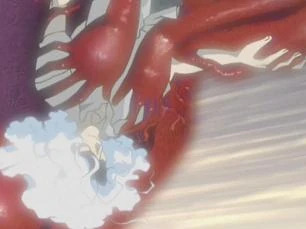
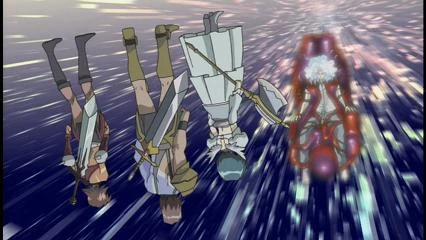
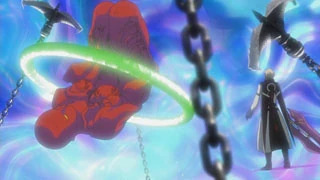
It was around this period that she began breaking & twisting things to try & escape the paradox she was trapped in. Re-styling herself from Harold's idea of a mother into the Cursed Wave.
This included orchestrating the hunting down and deletion, IE murder of other Vagrant AI's that were forming as a result of the Black Box meant to birth Aura, IE, proto Aura's, like Lycoris.
"I am an unwanted child. Even God doesn't want me." — Lycoris —
As well as using Macha or Guardians to 'Data Drain' any humans who get to close, which at its lightest, leaves them temporarily comatose, destroys their characters and has a negative impact on their mind.
You might notice Moraganna Mode Gone has not yet been established as making an appearance, good eye.
See, one of the things that makes her so interesting to me is that Moraganna Mode Gone is nominally omniscient, omnipotent and omnipresent figure.
She is the underlying system of The World itself and for all intents and purposes a force of nature. As a result she primarily acts through intermediaries, or by guiding others to act for purposes.
Managing to make a villain like this work, and work so effectively is one of the biggest strengths. As it is, we pure Moraganna Mode Gone as a disembodies voice that influences the world & creatures.
She also has some fantastic lines, though not quite as effective without the atmosphere and delivery, I still love them, such as:
"The higher up it is dropped, the worse the crash will be. Hope is the best spice to bring out despair." — Morganna Mode Gone —
In order to accomplish her goal, Moraganna Mode Gone has Macha manipulate and Data Drain Tsukasa. A human who she had been watching and trying to replicate for some time, but without getting what she needed for her goal.


This also involved warping Tsukasa's memories, leaving only those of her abusive father, and creating a divide between her real world identity of Shoji and online identity Tsukasa, to further weaken his ties to the real world. Tsukasa's gender is rather liquid, as far as I can tell and either way, also a lesbian.
"The World and all of its wonders; this is my world, you see."— Tsukasa —
The reason for this was to essentially tie Tsukasa's desire to stay within The World to Aura's development. So long as Tsukasa never wanted to leave, Aura would never want to wake up.
However, other determined players, isolation, and a disconnect from physical sensation leading to alienation led to Tsukasa gaining connections and desires outside of simply staying in The World.
This, Morganna Mode Gone began... Moving chess pieces so to speak. Orchestrating traumatic incidents. Giving Tsukasa a pet monsters for protection but that would also attack those she wanted gone. As Tsukasa continues to develop independence Aura's health improves, VS her sickened, pallid state when Tsukasa is locked in survival mode.
Things eventually come to ahead and well,

Morgnanna Mode Gone basically destroys Tsukasa's mind to ensure a perpetual state of despair and catatonia. Permanently stunting Aura's development.
Much of the rest of the series, is centered on the rest of the characters gaining the necessary knowledge to finally understand the situation.
As well as the Macha fragment of Morganna Mode Gone's ties to Tsukasa creating doubt and Subaru and Tsukasa's bond managing to slowly begin waking Tsukasa up.
Which naturally leads to Morganna Mode Gone needing to orchestrate more despair, but circumstances such as the bastion of Net Slum & her programming keep her from auto winning.
A great deal happens, including some mind fuckery and illussion conversations. Along with more classive abuser tactices like holding the threat of what awaits Tsukasa in theoutside over head.
But eventually Aura is awakened by Tsukasa's desire to return to the real world regardless of the hurled and the characters escape with Aura, thanks to the turncoat Sora.
Suffice to say this doesn't pan out well for him.
Morganna fragments more of herself and uses him as a sort of beacon & vessel to craft the first Phase of the Cursed Wave:
"Riding the Wave is Skeith, the Shadow of Death, to drown all that stands." — Epitaph of Twilight —
This is such an imposing threat that Helba, thematically the same Helba, Queen of the Dark from the Epitaph of Twilight, has to erase the entire world segment they are in just to keep Skeith away from them and put Aura beyond its reach for a time.
Skeith continues to be hosted inside Sora in an ensuing novel, with Sora flittering between amnesiac, malevolent brat and an utterly inhuman monster which violates the basic principles of the game.
But is eventually devoured by Skeith and continued hunting down Aura until the Phase is defeated in .Hack Infection. A memory of Sora leaves behind a reward for the one who did the deed.
Moraganna Mode Gone wasn't done however.
As all this was happening, she basically began fragmenting off parts of herself into other portions of the Cursed Wave:
Skeith:"The Terror of Death"
Innis:"The Mirage of Deceit"
Magus:"The Propagation"
Fidchell:"The Prophet"
Gorre: "The Machinator"
Macha:"The Temptress"
Tarvos:"The Avenger"
Corbenik:"The Rebirth"
Relying on the logic that Aura wasn't yet 'finished' or otherwise not not correct 7 so needed to be destroyed like any other Vagrant AI, so Morganna could start the process over again.
These phased also sent anyone they encountered into comas and even altered electrical installation and internet usage with their presence, while generally corrupting The World.
Fun fact, they all have the symbol of an eye on them representing Morganna Mode Gone's presence in them and her observing the world through them.
Skeith actually did manage to capture and fragment Aura, but not before she created the Bracelet of Twilight, and with it the Eldrich horror Cubia to combat the Cursed Wave.
Morganna Mode Gone would eventually fuse with the last of her Phases in a bid to directly end her foe that had slowly, over the course of four games, destroyed the other seven phases and Cubia.
Ultimately, Aura had to sacrifice herself to ensure Morganna Mode Gone would be destroyed, but in doing so, also allowed herself to be reborn .
Remnants of her continue to haunt and corrupt the world in the form of Data Bugs and an effort by the parent company to recreate her through the lingering fragments of the Eight Phases doesn't go quite to plan, let's say.
Conclusion:
But yeah, Morganna Mode Gone, No one is doing it like her, she has everything:
She is a force of nature and omnipresent goddess, to a Gnostic false god & a program breaking itself & everything around it in the quest for agency inside its own mind that struck down her creator.
She's a woman bound to and violently rejecting the sacrificial role of mother & seeking to destroy that which will supersede her & a manipulator and abuser, as well as philosopher and prisoner.
She is a corruptive influence on the world as well as the very foundation upon which the world world itself is built & she is the Cursed Wave, part of a story, a myth, a poem that is woven into The World itself.
What's more,
Her fragments in the Cursed Wave Phases are all a wonderful blend of eldrich, Biblical & elemental. Something only enhanced by the games Graphics of the time:


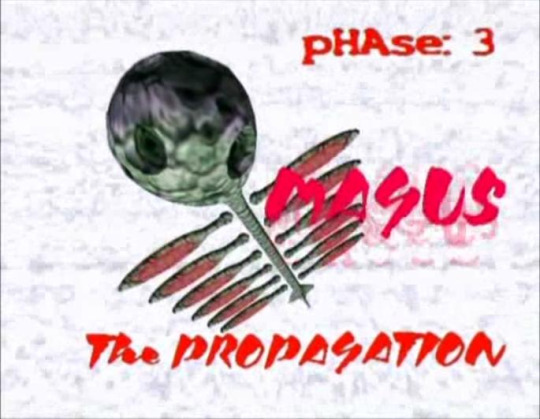




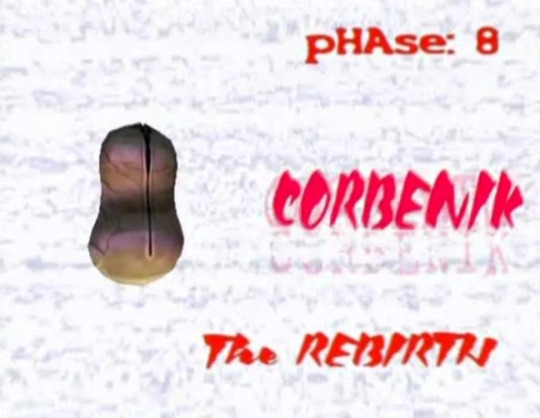


#.Hack#.hack//sign#Morganna Mode Gone#Meta#Analysis#Tsukasa#The Epitaph of Twilight#Your parents will haunt you#Sci-Fi Eldrich-ness#Text Post#My Writing#.hack//infection#macha#dot hack
43 notes
·
View notes
Video
youtube
Gardenia and Marlo [4] Dot Hack// Outbreak
#youtube#youtube gaming#youtube video#youtube channel#youtube lets play#youtube playthrough#gaming#lets play#playthrough#lets play dot hack#lets play dot hack imoq#lets play dot hack outbreak#dot hack#dot hack imoq#dot hack outbreak#ps2#jrpg#mmo#mock mmorpg#mmorpg#dot hack playthrough#dot hack imoq playthrough#dot hack outbreak playthrough#epitaph of twilight
4 notes
·
View notes
Text
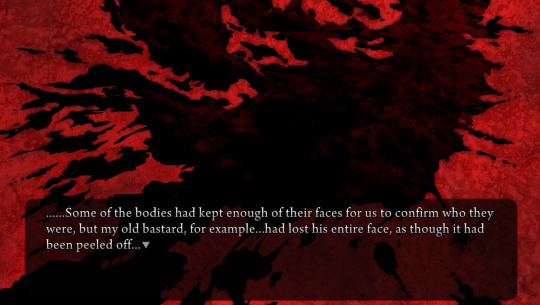
revisiting the "bodies with no faces" argument to prop up a faked corpse theory is. hrm.
#umineko liveblog#thinking back to the first twilight and how everyone except for two people had their faces destroyed#which leaves you with two options. either suspect krauss and/or shannon or suspect everybody except those two#battler's thinking pushes you to the four but none of the siblings or gohda really indicated the ability to do a murderscheme like this#shannon almost definitely knew more about the witch narrative than she let on#but that makes it clear she was killed by mistake and was probably intended to survive for longer than she did#krauss is sly enough to maybe do the fake death thing#but he's not in on the witch narrative so there's no way he could have done any of this#and there's no way genji would permit number one failson supreme to survive#going to the other four. gohda is not relevant enough for this kind of plotting#rosa's character arc was tied up with maria and not the wider series of murders#rudolf had unfinished business with that 'i'm gonna die' thing we never got resolved#but i think if anything that mystery'll tie into solving the epitaph's riddle rather than the actual murder stuff#and kyrie was a tutorial character there to introduce some of the story's themes#she was a little sly and calculating but her whole thing was about how status triumphs over smarts on rokkenjima#so really none of the dead six fit a culprit profile nicely even if it is plausible
28 notes
·
View notes
Text
I finally read the Umineko VN last year and had the funniest possible experience:
Finished Episode 1. Sat down with a pen and paper and meticulously solved the epitaph in a way that incorporated tons of Japanese wordplay to arrive at another thematically appropriate kanji wordplay riddle, the answer to which pointed to a specific location. Was completely incorrect.
(under read more because massive spoilers for Episode 1 and one technically Ep3 spoiler re: the "village" and someone's name)
My base assumption was: the names of the victims, in particularly kanji wordplays, are needed to solve the epitaph--a classic trope of shinhonkaku where the longer the case goes on, the more punny 'clues' are given, with the solution being either an admission of guilt or a clever misdirection.
I also figured out that the "village" refers to the 'ri' in Maria's name and that the river is the family tree (you can imagine my satisfaction when they actually brought it up two episodes later), so even more hints that you should be looking at the family's weird names.
My thinking process:
First Twilight - four people with their faces smashed in + two people with only half their faces destroyed. Human face = their identity = their name. You pick the six "chosen as sacrifices", therefore the four full names and halves of the two remaining names. Anagram time! Unfortunately I lost my notes and don't remember the entire thing I figured out, but the only truly important syllables were "on" (音) from Shannon and the "goh"/"gou" (郷) from Gohda.
Second Twilight - tear apart the two who are close. Well, how can you signify that two people are close in the first place? You can use a possessive: Eva's Hideyoshi, or Hideyoshi's Eva. In Japanese, you use the particle 'no': X の Y. The thing separating the two names who are close is therefore... the particle の itself, "no"!
Third Twilight - praise my noble name. The self-explanatory answer here is just "Beatrice".
Fourth to Eighth Twilights - gouge the head, chest, stomach, knee, leg. Similarly to the First Twilight, this means choosing parts of the victim's names. If 'head' signifies the beginning of the name and "leg" is the end, we get in order:
[K]inzou K[a]non Ge[n]ji Nan[ji]o (the hiragana is 'ji') Kumasa[wa]
Ninth Twilight - the witch shall revive (or, as is the trend in this solution, her name will be revived). How? By simply reading everything we just came up with until now--and answering the resulting riddle:
'OUGON NO BEATRICE' KANJI WA?
"What are the kanji of Beatrice the Golden?"
There are a thousands possible solutions, but the important thing is to notice that the name ベアトリーチェ, Be-a-to-ri-(i)-chi(e), contains a certain word.
For example, something like this:
TORII CHI (E) = 鳥居地へ
"[go] to the torii grounds".
You know, like the suspiciously missing torii gate that was foreshadowed near the beginning of the game? Woah, I can't believe I actually found the location of the treasure! (wait what do you mean it's wrong)
#umineko no naku koro ni#the spirit of Jounosuke Ryuuguu possessed me that night#(if Jounosuke was hilariously wrong)
37 notes
·
View notes
Photo

The Poems of Christopher Marlowe
Christopher Marlowe (1564-1593), also known as Kit Marlowe, was one of the most influential dramatists of Elizabethan theatre. Though he is best known for his plays, his poems were very popular in their time and are still well-regarded today. These include his translation of Ovid's Elegies, his pastoral poem A Passionate Shepherd to His Love, his narrative romance Hero and Leander, his epitaph On the Death of Sir Roger Manwood, as well as excerpts from his play Doctor Faustus.
Ovid's Elegies
Scholars generally agree that Marlowe's earliest work was probably his translation of the Amores, three books of Roman literature by the poet Ovid (43 BCE to c. 17 CE) in which a male narrator addresses his mistress. The original poems, written in Latin when Ovid was still a young man, would have been viewed as rather scandalous in Marlowe's time; indeed, scholar Stanley Wells describes them as celebrating "the delights and excitements of, especially, illicit heterosexual love, of promiscuity, seduction, and adultery" (78). Marlowe's decision to translate this specific work, likely undertaken when he was still a student at Cambridge circa 1584, was therefore "a characteristically transgressive act" against "the religious and moral establishment" (ibid).
Marlowe's translation of the Amores – known in English as the Elegies – was a more groundbreaking work than it may first appear. Not only was it the first known translation of Ovid into English, but it was also the first time that the rhymed heroic couplet was used in such a long-form way in an English text. As scholar Georgia E. Brown explains, "the patterning and arrangement of words carries a lot of the argument in the couplet, which exploits balance and contrast, and lends itself to the process of comparison, juxtaposition, and apposition" (Cheney, 113). Marlowe was not merely translating an existing work, then, but building upon it, and creating something that English literature had not yet seen. One of the most famous poems from Marlowe's translation of Ovid's Elegies is the fifth elegy from Book One, in which the lust and passion of the narrator are on full display:
In summer's heat and mid-time of the day
To rest my limbs upon a bed I lay,
One window shut, the other open stood,
Which gave such light as twinkles in a wood,
Like twilight glimpse at setting of the sun
Or night being past, and yet not day begun.
Such light to shamefaced maidens must be shown,
Where they may sport, and seem to be unknown.
Then came Corinna in a long loose gown,
Her white neck hid with tresses hanging down:
Resembling fair Semiramis going to bed
Or Lais of a thousand wooers sped.
I snatched her gown, being thin, the harm was small,
Yet strived she to be covered therewithal.
And striving thus as one that would be cast,
Betrayed herself, and yielded at the last.
Stark naked as she stood before mine eye,
Not one wen in her body could I spy.
What arms and shoulders did I touch and see,
How apt her breasts were to be pressed by me?
How smooth a belly under her waist saw I?
How large a leg, and what a lusty thigh?
To leave the rest, all liked me passing well,
I clinged her naked body, down she fell,
Judge you the rest: being tired she bade me kiss,
Jove, send me more such afternoons as this.
Read More
⇒ The Poems of Christopher Marlowe
#History#ChristopherMarlowe#DoctorFaustus#ElizabethanAge#EnglishLiterature#HeroAndLeander#Ovid'sElegies#Poetry#WHE
44 notes
·
View notes
Text
Why you aren't, but should be shipping Mihawk and Perona together, an essay.
First of all, Perona and Mihawk are adults. When they met, Perona was 23 and Mihawk was 41. Yes, this is an eighteen year age gap, but I want to start with this because it's the primary reason I see for people not liking the ship. After two-three years living under the same roof, by the time Perona leaves to go find Moria she is 25-26 and he is 43-44 (depending on how long you believe is sailing time between arcs and when their birthdays may fall between the time Zoro was dropped off at Sabaody and the summit at Mariejois took place.
Let's pretend for a moment Mihawk really is a vampire. This means one of two things, either he died at 41 and is actually centuries old, or he became a vampire sometime in his 20s and is legit 44-45 years old. Either way, Mihawk comes off as extremely old fashioned in the way he talks, the way he dresses. I would say he, like Perona, is a gothic romantic. Romantics tend to put their other passions first in favor of actual romance, keeping this in mind this would indicate that like many handsome dark brooding autistic men before him (the good ol' Darcy type) he has put romance on the wayside because he wants a love that is real. This is not an uncommon romantic trope amongst gothic romantic and vampire lovers and generally stories with immortals.
Often in fiction and romance novels the centuries old immortal is paired with a mortal (usually completely human) woman between 18-35. This type of romantic man has waited centuries for the right person they could form a lasting bond with and has not had much experience with actual love, if at all. For a few examples: ACATOR series Feyre and Rhys got together when Feyre was 20, and before that she was even younger with her first faerie boyfriend. In All Souls Trilogy Diana is suggested to be in her late 20s/early 30s and Matthew is pretty much old as dirt. In the Twilight Series Bella was 17 when she met Edward, who was 104. These are a trope for a reason, and when done right it’s a pretty good trope.
I'm going to include an incredibly unpopular opinion here, but "Goth Fam" is weird and here's why. While amusing in theory, portraying two grown adults and another grown adult as children and one adult is incredibly infantilizing. I won't disagree Zoro and Perona have a very close relationship where Perona especially is seen taking care of and is incredibly protective of him, I don't see where this necessarily makes them sibling coded (the same way I don't think Nami and Zoro are sibling coded). I won't get into that in more detail here about my thoughts on Zoro and Perona, but here's my hot take.
Both Zoro and Perona are incredibly autistic coded, which makes drawing them drawn as children with Mihawk incredibly cringe. Mihawk did not know Zoro and Perona as anything but adults and does not get a right to claim either of them as his children unless they offer that up first. We never see either one of them directly call Mihawk a father figure.
A 5’3, petite queen, the way Perona dresses and wears her hair is a fashion statement. I don't think she would like being portrayed as an actual child. Post-time skip she even has a tattoo on her arm the same place Nami’s tattoo is placed on her left arm, permanently branding herself and displaying her loyalty as a Thriller Bark Pirate. Perona does not need another father figure, she has not only Moria, but multiple other male figures in her life from her crew more rightful to the claim of being a parental figure than Mihawk does.
I think some people take the title ghost princess too seriously. Do not get it wrong, Perona is Moria's Ghost Princess and has been a pirate since she was presumably a child. Of course her epitaph is ghost princess. But if you see the way she is treated by Moria, he lets her run the place. There's signs of her everywhere, she shows up to his meeting like lol boring you woke me up for this? He lets her have a pick of whatever servant she wants and I'm pretty sure she has Thriller Bark’s master bedroom. She's like Regina George meets Usagi meets a pastel goth pirate.
This also brings me to Mihawk calling Perona "musume". I think Mihawk calling her "gosuto musume", just like her epitaph, is taken too literally. In the modern context, this might mean daughter, but we've already established nothing about Mihawk is modern. One Piece itself is supposed to be 1500s if we're going to get super technical.
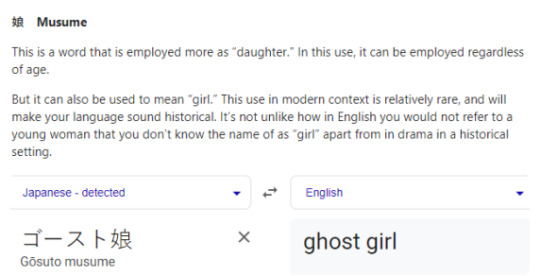
Not only is Mihawk incredibly proper, but he's also a piece of shit. This is the same guy that called Zoro a little green froggy when they first met just to get a rise out of him. We only see him calling her this once, and this was presumably days after they met (a week or two tops). Immediately after she's called this, Perona yells at Mihawk not to give her orders. Contextually, this could be taken that he's giving her a backhanded compliment for appearing youthful, a lot like calling someone "auntie" might be taken as offense to the wrong person, which would indicate he's trying to get a rise out of her and it worked
When they first meet, it does not go too well. Perona was already incredibly lonely to begin with before Zoro was dropped onto the island, she had taken care of his wounds for days on end and spent at least a week playing hide the swords so she had someone to keep her company. Meanwhile Mihawk is mildly irritated his quiet castle has uninvited guests and Perona's demands of him, his blasé attitude towards Zoro going out and trying to get himself killed has Perona deciding that he's heartless and she doesn't want to be alone with him.
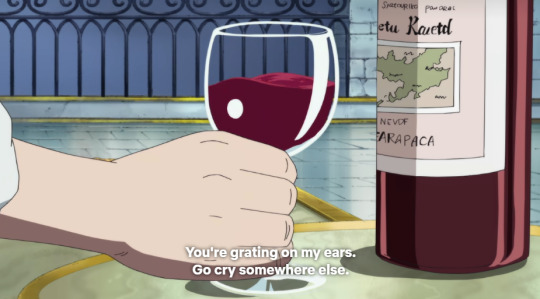
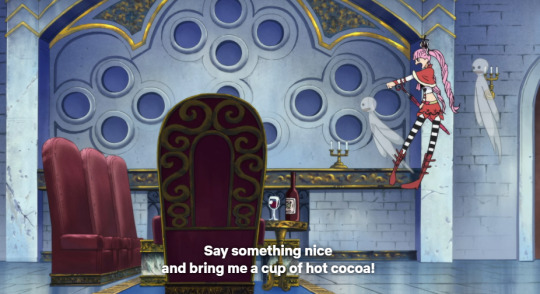
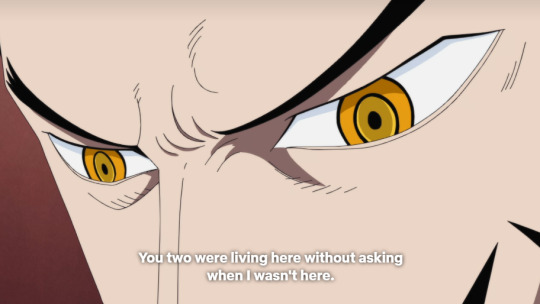
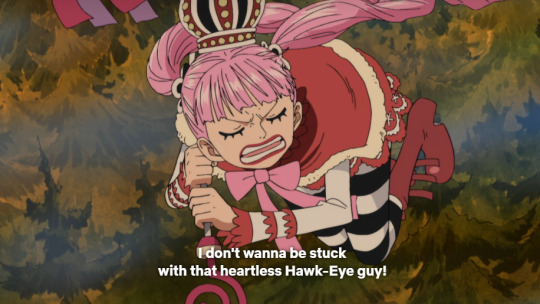
Somewhere within two years, this changed. Not only does Perona go back to the island after seeing to it that Zoro didn't get lost trying to find his own damn ship, but when it's time to go we get a glimpse of what kind of life they've lived without Zoro around. If she couldn't stand him, that would have been the perfect time to go.
Instead, we see that they have high respect for one another enough to take care of each other. To me, this bickering between them about what they did together isn't a conversation between a father and a daughter, it's a lover's quarrel.
This is your typical “old married couple” banter. She’s saying "you never liked my father and you're ungrateful" and he's saying back that she's the ungrateful one because he's done more than enough for her in return to prove he does care.
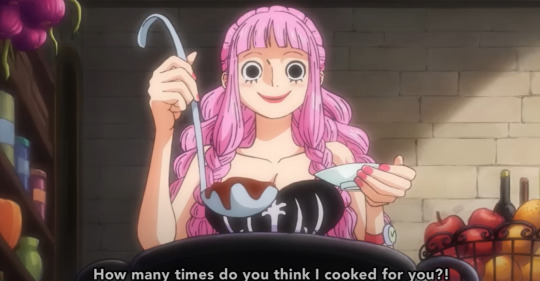
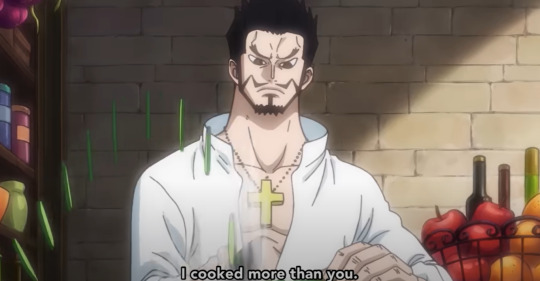
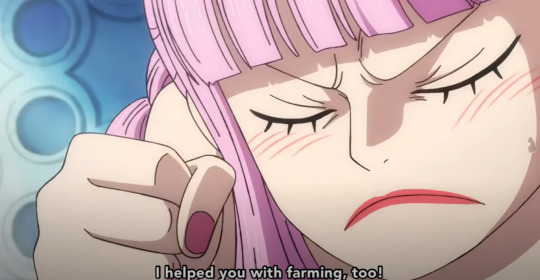
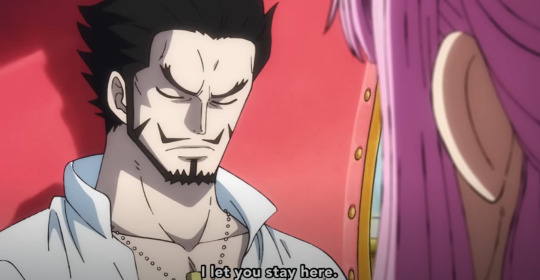
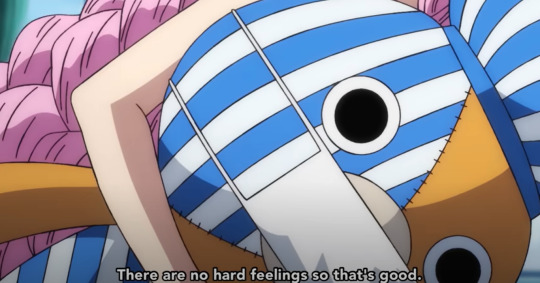
I think Perona is trying to start a fight here, to protect her own heart so that she can leave on hostile terms and this bastard reels her right back in with just a few words.
When Mihawk says this, there's a pause in the music from the silly arguing background, to this soft romantic beat, much like one might see in a romantic anime or drama when the couple are having a moment of intense feelings for one another.
Mihawk actually doesn't say much at all, but Perona knows his meaning immediately that if he didn't care for her in any way, he wouldn't have said anything at all.
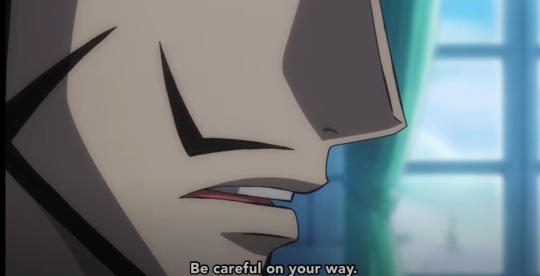
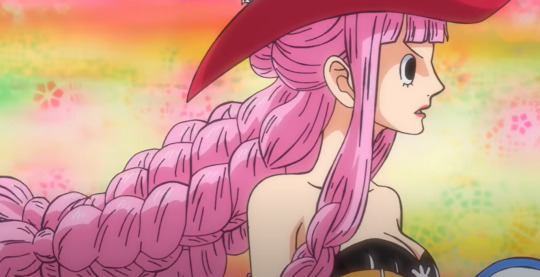
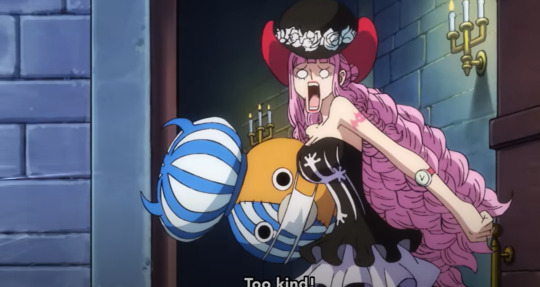
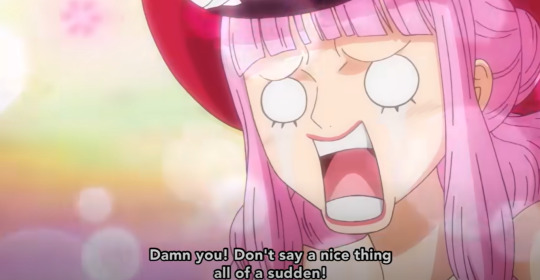
Perona's personal style has changed a lot in the last two years. She no longer wears her hair in pigtails and appears in a younger style. If anything, it looks like her personal style is heavily influenced by Mihawk's in romantic black, whites and reds. She hung up her crown (presumably because she was under the impression Miria was very likely dead and he was the reason she was a proper princess). Her hat in particular is very much the female version of his, featuring white roses instead of a big fluffy feather. Red lining and all.
Hats in One Piece are so important, and I personally love the idea of him gifting her a hat to make her feel better about hanging up her crown (or because she was stealing his- one of my favorite headcanons).
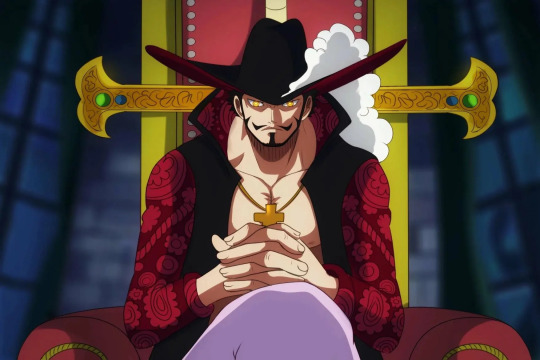
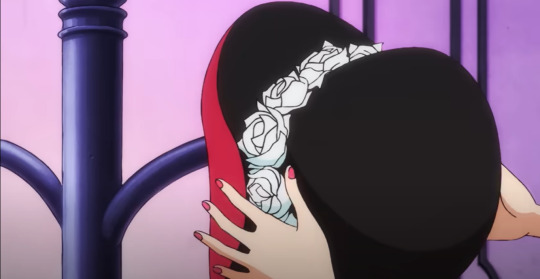
#dracule mihawk#perona#mihopero#mihawkperona#mihawk x perona#mihawk/perona#one piece#one piece ships#one piece shipping#gets ready to get blocked and or bood
54 notes
·
View notes
Text
The Tie Which Linked My Soul To Thee
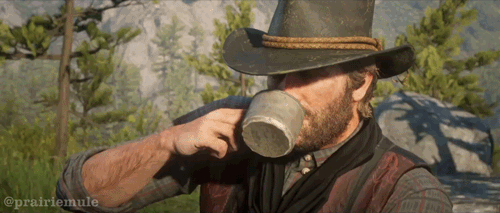
Hi everyone! I have a new Arthur x female!OC fic I've been working on that's posted up on Ao3, so I figured I would share it here as well. Please let me know what you think! This story is currently still on-going :)
Ao3 Wattpad Masterlist - All Chapters Ch.2 Ch.3 Ch.4 Ch.5 Ch.6 Ch.7 Ch.8 Ch.9 Ch.10
Summary: Kate McCanon, a young widow from the north, meets outlaw Arthur Morgan. When the two cross paths she discovers a complex man wrestling with his own sense of right and wrong. As their unlikely bond deepens, Kate becomes determined to guide Arthur towards a brighter path, even as tensions rise within his gang led by the enigmatic Dutch van der Linde. With danger lurking at every turn, Kate must navigate treacherous territory to protect those she holds dear, all while finding love in the most unexpected of places. Tags: Arthur Morgan/Original Female Character, Widowed, Original Character, Mutual Pining, Slow Build, Eventual Smut, Eventual Romance, Fluff and Angst, Hurt/Comfort, High Honor Arthur Morgan, Friends to Lovers, Child Loss, Trauma, Canon-Typical Violence, Arthur Morgan Does Not Have Tuberculosis, Arthur Morgan Deserves Happiness, Chubby Arthur Morgan, Alternate Universe - Canon Divergence
Chapter 1 - The Frost Gleams Where The Flowers Have Been
1890
Kate had never fancied herself a skilled woodworker. While she had lent a hand to her husband in constructing a barn, her role mostly entailed passing him tools and bringing him his lunch. But as she stood amidst the sawdust, tears streaking down her cheeks, she grappled with the daunting task ahead. She lacked both the sufficient wood and the patience to craft two coffins. Thus, the inevitable decision emerged: they would be laid to rest together.
The Reverend's suggestion to cremate the bodies, emphasizing the need to eradicate the disease completely, fell upon deaf ears. The mere thought of reducing her beloved husband and precious baby girl to ashes felt abhorrent to Kate. Instead, she harbored a tender hope that one day, perhaps, they would blossom into a magnificent Willow tree.
Amidst the melancholy chore, the vibrant symphony of birdsong provided a bittersweet backdrop, reminiscent of the lullabies she once crooned to her infant daughter. With a sorrowful melody humming in her heart, Kate toiled diligently, her hands blackened with grime, each wipe across her tear-stained cheeks a testament to her grief. As the sun dipped below the horizon, casting their modest farm in a golden hue, Kate's work pressed on.
Night descended swiftly, cloaking the world in shadows that seemed to stretch for an eternity. Kate, perched upon her porch swing, found no solace in slumber. Her vigil was solemn, her gaze never wavering from the rough-hewn coffins that cradled her entire world within their confines.
With the break of dawn, the Reverend returned, his disapproval evident, yet tempered by resignation. Together, in a somber silence, they labored to fashion a final resting place. By mid-afternoon, the grave stood ready, a solemn abyss awaiting its occupants. With the Reverend's assistance, Kate tenderly lowered her cherished husband and daughter into the earth's cold embrace.
As dusk settled, the Reverend offered prayers and parting words before taking his leave. Left alone in her sorrow, Kate felt the weight of despair bearing down upon her. In a world forged by men and seemingly devoid of solace for a solitary widow, she found herself with no recourse but to depart.
Beneath the twilight sky, the epitaph etched upon their shared gravestone bore silent witness to her profound loss:
Here Lies My Beloved Noah, And Our Beautiful Daughter, Lorena.
May God Keep Their Souls.
━━━━━༻❁༺━━━━━
1899
As the sun rose over the horizon, casting its golden rays across the sprawling expanse of Emerald Ranch, Kate found herself amidst the ebb and flow of another day's labor. Nine years had slipped by since the tragic loss of her husband and daughter, a span of time marked by wandering footsteps and the pursuit of odd jobs on her journey westward.
She had once heard her father say they had family in California, he had many sisters but only kept in touch with one. Kate wrote to her after the death of her husband, seeking asylum with a relative with nowhere else to go. Her Aunt wrote her back and gave her condolences, she said Kate would be welcome with open arms.
However, the last she heard of her Aunt was 7 years ago. But still, she continued west. She had come too far and been through too much to stop now. What she hoped to find in the valleys of California, she did not know anymore. Over the years she became more cowboy and less of a woman, her once soft hands now calloused by years of labor. The untamed plains and cold hard ground had become both her refuge and her bed.
She came to Emerald Ranch only a week ago, her boss; Seamus, was reluctant to hire a stranger, let alone a woman, to help on the ranch. Kate assured him she was cheap labor and was only looking for shelter and a place to rest until she was on the move again. Kate was no stranger to odd jobs, she took any work she could get and saved as much as she could. But she was no criminal.
She heard Seamus talking to two men as she filled the troughs with clean water. The gentlemen said they were new in town and looking for a partnership, one in which they could both make money.
“Look I ain't no idiot, and I don't trust folks outta the blue. If you want to work together then you're gonna have to prove to me you’re worth my time.” Her boss's voice raised above the usual noise of the barn animals.
“Of course! We’re only interested in a partnership, just looking to make a little extra money.” Carried the voice of an older gentleman.
“No doubt. I do interesting very well. It's trusting that I don't do so well.” her boss answered, still not convinced by the two strangers.
“Look at us, we’re honest as the day is long,” said the other man with cheer.
“You really want us to prove ourselves to this clown Hosea?” said the other voice, sounding much younger than his partner.
Seamus scoffed, “good day to you, Hosea.”
“N-now wait a minute Seamus. Arthur can be rough, and quick with his tongue, but I swear you can trust him, you can trust me.” Hosea pleaded, following Seamus to the side of the barn. Kate now had a clear view of the new “business partners”.
Kate didn't know Seamus very well, but she could tell he was an honest enough man. Wise for his years, and liked to keep his nose out of trouble. “I’m an old man Hosea,” he began, “and you know why I ain’t dead yet?”
“Because you don't trust idiots,” Hosea finished.
“Exactly.”
“We’re not idiots, Seamus. Let us prove it to you.” Hosea had an air of confidence, he wasn't some runaway bum looking to make a quick buck. He was serious about a partnership. Although Kate wouldn't say the same for his partner, who loomed behind them like a panther ready to pounce.
“Okay…I’ll tell you what, old Bob Crawford and his boys just bought a beautiful stolen stagecoach from up north. It’s in their barn. Now you go get that,” he looked around for anyone who might be listening to his scheming, “then we can work together.” He said quietly, placing a hand on Hosea’s shoulder.
“Who’s Old Bob Crawford?” inquired Hosea.
“An acquaintance of mine…well, not just an acquaintance. He’s my cousin, by marriage.” Seamus explained.
“Oh so now we’re meddlin’ in your family business?” Arthur boasted with skepticism.
Hosea waved him off and continued speaking, “Where is he located?”
“Now hang on a moment, you boys could very easily take this coach and sell it yourselves for a pretty penny,” Seamus began.
“So you comin’ with us? I thought you didn't want to be involved in shady business?” Arthur spoke up again.
“Heavens no, if my cousin saw me it would be my death. I'm sending someone with you, as collateral.” Seamus turned around and saw Kate already watching them, he waved her over.
Arthur shook his head disapprovingly, “nah, I don't do babysitters Seamus.”
Kate was just as skeptical about her part in this, she told Seamus she was looking for honest work, and robbing his cousin certainly falls out of that line.
“She’s not babysitting . She’ll take you to my cousin's farm and let you do the robbing. Kate has been working for me for a few days now and she’s tougher than she looks.” Seamus said turning to Kate, “I want you to make sure that stage coach gets back to me. You don't need to take part in the robbery.”
“You’re fine with them robbing your cousin?” She spoke in a hushed tone so only Seamus could hear.
“By marriage,” he added, “and yes, I would love it. The man’s been a thorn in my ass for years.” He said amused.
She nodded in acknowledgement and turned to get a good look at the two strangers. One was indeed much older than the other, with cropped white hair peeking out from under his hat. The other gentleman was tall and burly, and he hid his eyes under the brim of his hat. He seemed wary of strangers and kept both hands resting on his gun belt.
“Let me get my horse saddled and I’ll meet you boys at the intersection leading out of town.” She spoke, Hosea nodded and was already making his way to his horse. Arthur stood for a moment eyeing the woman, no doubt playing the intimidation tactic. But Kate had seen far scarier men than him in her days. “Y'know the quicker we get this done the quicker you fellas get paid.” She noted.
Arthur scoffed and finally followed Hosea to his horse, “don't need no damn babysitter,” he grumbled kicking dust.
━━━━━༻❁༺━━━━━
Kate made quick work of saddling her black Hungarian roan, she calls Lorena. After her infant daughter. In a moments pass she was on the dirt road leading out of Emerald Ranch and toward Carmody Dell. She waved for the two men to follow her, they stayed behind her a short distance and made no effort for small conversation.
However, she overheard snippets of their own conversation as they went, “I thought you wanted me to be the strong arm? That's usually how it goes,” Arthur spoke.
“Yes but..” Hosea hesitated, lowering his tone a little, “you know how this works.”
“Cmon Hosea that fellers a joke, he don't even trust us enough to handle it ourselves. Now we got a chaperone.” Arthur complained loudly, at least he’s not calling me a babysitter , Kate thought.
“All the better, he won't cause us any problems. And I cant blame the guy for sending the girl. Two strangers looking for quick money? Hell, I’d want assurance too.” Hosea answered, “besides, if he’s sending protection that means there’s big money to be made. Seamus wants his cut.”
Kate came to the same conclusion, up until now Seamus had given her the usual ranch-hand tasks. Feeding and cleaning mostly. This was very different, there must be good money for this stage coach.
“I guess you’re right,” Arthur muttered.
Hosea mumbled something back to Arthur about “hanging up their hats” if they couldn't finish a job as easy as this. They laughed and began chatting about their travels in Emerald ranch, Kate tuned them out and began humming a song to her horse.
Her singing always pleased her horse and calmed the girl’s nerves. She was a strong and fierce steed, but jumpy and needy like a baby sometimes. Kate thought naming her horse after her daughter would bring her closure, instead, she was almost convinced that her daughter's spirit lived on in Lorena somehow. In all ways except biological, her horse was her baby.
Carmody Dell was a short distance north past the train tracks and Fort Wallace, Kate had passed it once before. They rode at a steady pace, the men behind her never coming too close. She wondered for a moment what their story was, and why they needed money so bad. Perhaps they were travelers like her, maybe they even had a caravan. She entertained the thought of traveling with a group again, but shuddered at the memories. Her previous caravan adventures had not ended well.
Once the ranch was in view she slowed and allowed the boys to catch up on either side of her. She led them to a grassy clearing off the road.
“You should continue on foot from here, I’ll stay behind with your horses.” She said dismounting. The two of them nodded and dismounted their horses, Kate was almost surprised to hear no objections from Arthur.
“C'mon son, let's see what we’re dealing with here.” Hosea commented walking towards a large rock in front of the house.
“Son”, so they are family . She mentally noted. Arthur gave his horse a pat, “be a good girl for the lady” he said, tipping his hat towards Kate. She was slightly taken aback by the sudden politeness.
She busied herself with the horses for a bit while the men laid out their plan, she gave Hosea and Arthurs horse a treat and was about to start brushing his horse when he approached her again. Startled, she backed away from his mare, she didn't want him to think she was snooping in his saddle bags.
“You can keep brushin’ her, she loves attention,” he half smiled reaching up and petting her snout. “I just came to tell ya’ we’re gonna wait till it gets dark. Less chance of getting caught that way.”
“Smart,” she replied, for whatever reason she suddenly felt very shy in his presence.
He stood a few feet away from her and she could see more of his features. He was around her age. He had short dirty blond hair under his leather hat, and bright blue/green eyes. Her eyes lingered over his body. He was big too, more than a foot taller than her and well fed and muscular. His bicep had to be the size of her head alone, and she could tell by the fabric of his button down he had a bit of a belly hidden behind his gun belt.
“What’s her name?” His voice broke through her awkward silence.
“Who?” She asked and looked back at him.
He chortled, “the black beauty you got over there,” he nodded to her horse.
Oh, duh! “Her name is Lorena, she also loves attention but she’s nervous around new people.” Kate answered, still a bit lost in her thoughts.
Arthur made a clicking sound with his tongue, reaching out a hand and slowly walking toward her horse. “It’s alright girl,” he cooed while she sniffed his palm. He pulled out a peppermint and gave it to her, which Lorena happily accepted.
Kate smiled at the interaction, “you introduce yourself to my horse before me?” she teased.
“My apologies ma’am,” he turned to face her, “names Arthur Morgan.”
“Nice to meet you Mr. Morgan, I’m Kate McCanon.” She reached out her hand and he shook it. His grip was firm but polite.
“Likewise, Miss.McCanon. That’s Belle your brushin’, and that’s Silver Dollar.” He pointed at Hosea’s horse. “I saw this beauty when we first rode into Emerald ranch, had no idea she was yours tho.” He was talking about her horse again, “told myself I’d inquire about buying her if she was available.”
Kate smiled at the affection he was showing for her horse, she knew Lorena was a beautiful mare. She often received compliments on the road, and many have offered to pay for her purebred.
“I’m sorry to disappoint you, but she’s not for sale.”
“Well I can certainly see that,” he laughed, “she seems happy though. You must take real good care of her.” He said, his attention still on her mare as he scratched under her chin.
���You some kind of horse breeder Mr. Morgan?” Kate asked.
Arthur laughed, “no no. Nothing like that, though sometimes I wish I was.” He smiled as he said it but Kate noticed there was a sadness in his tone. “I just think they’re neat is all.”
They had only just met, and while Arthur was not initially the most pleasant, she found it incredibly cute how enraptured he was by her horse.
“I should probably also apologize for my rudeness earlier, it’s been a rough couple weeks for us and we uh- don’t always take too kindly to strangers.” Arthur took off his hat as he spoke and held it to his chest, a sincere gesture.
Kate was shocked, the man she met at Emerald ranch not even an hour ago seemed like a completely different person than the man before her. His cold demeanor was gone, or at least reined in at the moment.
“No apology needed Mr. Morgan. I understand,” She answered. “Although I wouldn’t call it rude, you were just skeptical. Rightfully so, can I ask what brings you to Emerald Ranch?”
Arthur looked away from her as he spoke, choosing to focus on her horse. “We’re just stayin’ in the area for a few weeks. Passin’ through and tryna make money.”
“By robbing stagecoaches?” Kate said in an amused tone, “you a bunch of outlaws or something?” She continued, half-joking.
Arthur looked at her with surprise, “What? No, we uh- got laid off from the railway. Up-north. Just looking for money so we can find a place to settle down again. That’s all.” He looked away again, avoiding her gaze.
“I’ll say it again, by robbing stagecoaches?” She kept her tone playful, but wasn’t entirely convinced by his story. But it felt good to be the intimidator.
“Wasn’t our idea, Seamus asked us to rob his cousin!” His voice rose slightly with anger.
“By marriage,” Kate retorted.
Arthur was about to speak again but only stared at her.
“I’m just pulling your leg Mr. Morgan.” Kate laughed. “It’s no business of mine. I’m only passing through here, same as you. What you do here and how you earn your money is your business. As is mine.”
Arthur scoffed, suddenly amused, did this woman just tease me?
He went to speak again before another voice interrupted them, “Arthur! Get over here!” Called Hosea. He pointed a finger at Kate as to say this isn’t over and walked away.
Amused with herself, Kate grabbed an apple and sat down against a tree. Watching the sun set as she waited for the cover of night so the two men could pull off their heist.
━━━━━༻❁༺━━━━━
Kate woke suddenly to the sound of horses moving. She quickly got up and looked in the direction of the ranch. Sure enough the stage coach was steadily moving down the path away from its place in the barn. She quickly mounted her horse and trotted over to them.
“Nice work! Follow me back to Emerald Ranch and try to keep it in one piece.” She called up to Hosea who was driving the coach. With that she clicked her tongue and took off ahead of the coach at a steady but quick pace. Not wanting to get themselves caught.
Before Hosea could crack the reins he looked to Arthur as he was about to get in the coach, “you ride ahead with her. I got this.”
Arthur looked confused, “why wouldn’t I ride with you? The horses will follow.”
Now Hosea was giving him an amused look, “I heard you with her earlier.”
“And?” The cowboy replied slightly annoyed.
“You’ve never fumbled our cover story so bad!” He quipped, “it was like listening to a child tell it!”
Arthur shook his head, “now you’re playin’ match maker old man?” He teased, trying to hide his smile.
“I’m just saying it wouldn’t kill you to go talk to her son."
Without another word Arthur nodded and dismounted the coach, getting into the saddle and riding off to catch up to Kate.
#arthur morgan#red dead redemption 2#arthur morgan x reader#arthur morgan x oc#arthur morgan x original female character#hurt/comfort#eventual smut#eventual romance#fluff#ao3#ao3 fanfic#rdr2#rdr2 community#hosea matthews#dutch van der linde#rdr2 fanfic#fanfic#ao3 link#fanfiction#archive of our own#wattpad
121 notes
·
View notes
Text
Honestly I love Beatrice saying that the adults solving the epitaph was the least likely outcome. And Sayo talking about the epitaph being solved as a miracle that could potentially stop the tragedy. Like they really think the adults are idiots, and can you blame them?? Sayo only ever sees the adults at their worst, bickering over money and reverting back to childhood roles. How could they know that the adults are actually pretty smart when they put their differences aside and work together? They’ve never done that before!
A big thing that bothered me about chapter three was that Sayo must’ve killed at least Nanjo since Eva couldn’t do that, but Sayo also said the murders would stop if someone solved the epitaph. And yeah chapter 3 wasn’t written by Sayo but I still like each layer to make sense independently as well as in concert with the other layers. Now I think I get it.
Beatrice waited on the first night to see if they’d solve it, like always, and when they didn’t she just figured there’s no way they’d be able to solve it in the chaos after the first twilight. So she didn’t check. In the requiem tea party Beatrice says that the plan was to commit 13 murders if the epitaph wasn’t solved in the first night, never even seeming to consider that it could be solved on any other night. I think that if the actual intention was that they only had one night to solve it, that would’ve been made clear in the letter from Beatrice about solving the epitaph. It just genuinely didn’t occur to her that solving it later was an option
Eva going around murdering people doesn’t strike Sayo as particularly unusual either, like that’s Classic Ushiromiya Adult shenanigans. If anything it’s just an annoyance trying to make sure things still fit the epitaph, and to have to improvise instead of following the pre-written plan. With all of Sayo’s allies dead in the first twilight, there’s no one else who could check if the epitaph had been solved either
#umineko spoilers#umineko#umineko no naku koro ni#umineko when they cry#yasuda sayo#sayo yasuda#i use they/them for sayo if that caused confusion#i know people usually use she/her
32 notes
·
View notes
Text
Umineko Episode 3 Blog: Once Upon A Time
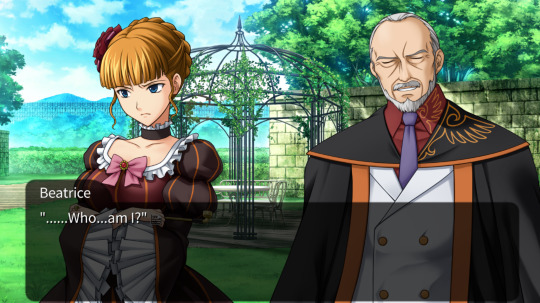
I had a feeling a topic like this would eventually come up. There are only so many "unforgivable" things a man in Kinzo's position could have done to his unrequited love. Somehow, it seems the truth was far worse than I thought.
I had found Episode 2 to be a largely uneventful affair. I liked the focus on Shannon and Kanon's characters at the start, and their relationship to "Beatrice," and Rosa was a riot as usual, but beyond that a huge chunk of it felt like I wasn't really getting much new information. Episode 3 kind of feels like Episode 2, but better. The magic part of the story is more interesting and has more meaningful implications on the mystery side of the story instead of being random nonsense, the game throws interesting twists on the mysteries of the previous games (killing off all of the servants on 1st Twilight was such a cool idea), and Ryukishi has provided so much important context regarding the killer's motivations, where before all we knew was that it was Sayo and her reasons had something to do with her solving the epitaph.
I'm told that people at the time found Episode 2 too difficult, and Episode 3 was in some ways a response to that, which is why we get treated to Virgilia explaining what an unreliable narrator is to Battler for the sake of those poor souls who hadn't caught on up to this point. It seems like Umineko has finally finished establishing its basic narrative tricks, and now we get to just have fun with it, although "fun" is maybe the wrong word for the main topic of this post.
Beatrice gets a bit shifty about explaining her backstory, as we'd expect from her. She wants us to believe that her death, as witnessed by Rosa, makes it impossible for the secret mansion to have any connection to the Rokkenjima murders, but it's clear that the Beatrice in the prologue is not the one from Rosa's story. Unfortunately, we've gone full Yu-Gi-Oh at this point and we have way too many different Beatrices running around, so for the sake of my sanity:
Beatrice I: Kinzo's mistress from long ago. May or may not have provided gold. Commit suicide after her daughter was born.
Beatrice II: Daughter of Beatrice I and Kinzo. Met Rosa. Died after falling off of a cliff.
Beatrice III: girl who broke a vase in the prologue. Describes Kinzo as her grandfather, which, troublingly, means she's probably Beatrice II's daughter.
Beatrice: Battler's nemesis in the meta-plot. On a metaphorical level, she's sort of a vague amalgamation of everything and everyone who's received the name of the golden witch.
Virgilia: Beatrice III's caretaker, who appears in the meta-plot and magic narrative as a mentor witch. In reality, Virgilia is Kumasawa. It's a well-executed Chekov's Gun: we were told in Episode 1 that Kumasawa often quits and then comes back after a while. The implication seems to be that whenever Kumasawa "quits" working for the Ushiromiya family, she's actually just being reassigned to the secret mansion to look after whichever Beatrice is staying there.
Sayo: masterminded the Rokkenjima killings, while occupying the role of the golden witch.
Eva: Kinzo's eldest legitimate daughter. Took over a significant chunk of the killings in Episode 3, after solving the epitaph. Was it simple greed, or are we again finding out that the epitaph hides an additional secret that makes those who solve it lean toward committing the killings?
EVA: Eva's inner child turned witch. Typically appears in the magic narrative to explain away the killings. Symbolically represents that Eva and Sayo do not have the same ends, even if they end up using the same means.
Ange: I guess they're just letting anyone be a witch these days.
Beatrice's explanation about being locked in the body of Beatrice II tells a horrid story between the lines: Kinzo had a daughter with his mistress, and after her death, he groomed his daughter to serve as her replacement. The fact that Kinzo has an extra grandchild we can't account for would seem to imply that he tried it twice. Beatrice tries to obscure this fact by working through Rosa, who didn't have enough context to understand the situation.
In any case, based on the timeline I'm guessing that Beatrice III is Sayo. She's the only realistic candidate I can think of who's involved in the story, and explains a lot. The servants are willing to work with Sayo out of a sense of obligation toward her, both because Kumasawa at the very least probably feels a lot of guilt at being complicit in the situation, and because Sayo probably became the de facto head after Kinzo died. I bet he'd sooner appoint her than anyone else in his family, although the rest of the family would certainly have disputed the claim if she'd come forward initially.
I do wonder what Kinzo was thinking having Sayo become a servant. Maybe a cover story, since the truth behind her birth was too shameful to admit? Another possibility is that the servants just got one over on ol' Kinzo and sent Sayo to the orphanage at some point, pretending she was someone else. I feel like Sayo had to end up at the orphanage somehow, even briefly as part of her cover story, since she needs to meet Kanon at some point.
The implications of this on Sayo and George's relationship aren't great, but we've already crossed that line by now, and Episode 2 did establish that Shannon avoids being physically intimate with George. Did Shannon enter this relationship in some attempt to get control over the family's assets, knowing that her claim would not be respected under normal circumstances, or did she only come to fully understand who she was and where she came from after solving the epitaph?
Sayo's connection to Beatrice feels very different now. Sayo probably doesn't even remember her mother, so the closest she's got is the legend of the witch. No wonder she takes on that role to get revenge on the family. The whole theme in the first letter of taking back what's rightfully hers fits much better as well.
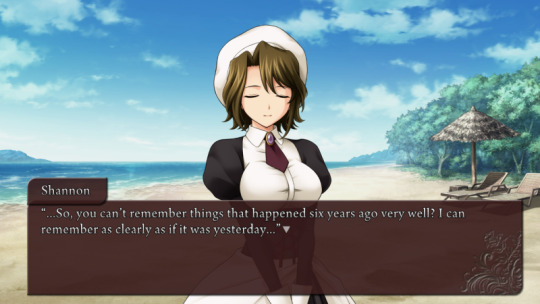
We still don't fully understand Sayo's motivations. The whole conversation on the beach about Battler's childhood crush really feels like it's foreshadowing a reveal later. I'm guessing it's something like: Battler threw out a cringy line about coming back for Sayo on a white horse because he was 12, and then ditched the family. Back in Episode 1, George asked Shannon why she had stayed employed as a maid for so long, after already saving a fair amount of money. The truth was that Sayo was envious of Battler leaving everything behind, and, like her mother blindly trusting Rosa, she secretly clung to the childish notion that one day he really would come back for her and take her away from Rokkenjima and the Ushiromiyas, but instead Battler came back and implicitly revealed what she probably should have known: he never took it seriously, and that was the straw that broke the camel's back.
That's enough of that depressing topic. Next time, we get treated to Peak Eva Content.
#umineko episode 3#liveblogging#umineko liveblog#umineko when they cry#umineko no naku koro ni#umineko
26 notes
·
View notes
Note
Hey, do you by chance have any dialog prompts for internet friends? Thanks!
Hi! This reminded me of how letters can sometimes be similar to how "internet friends" communicate. So here are some examples that may be used as prompts:
“Send me the words ‘Good night’ to put under my pillow.” —John Keats to Fanny Brawne
“To say I apologise just seems to be inadequate. Please write to me soon.” —Hughes to a ticked-off Lowell (similarly, internet friends may argue; one may apologise, sometimes beg for a response)
“I am lonely, Neal, alone, and always I am frightened. I need someone to love me and kiss me and sleep with me; I am only a child and have the mind of a child. . . . It is pure pity that I beg now, not comradeship or love or sympathy.” —Ginsberg to Neal Cassady (similarly, internet friends may confess their emotional turmoils)
“When you write my epitaph, you must say I was the loneliest person who ever lived.” —Robert Lowell, in his letter to Elizabeth Bishop, recalls this message to have been said by her
“Why are you alone in London, and when do you go to Salisbury? Do go there to cool your hands in the grey twilight of Gothic things, and come here whenever you like. It is a lovely place and lacks only you; but go to Salisbury first.” —Oscar Wilde to Lord Alred “Bosie” Douglas
“How can Death get at the Unborn, go back before birth and look at death. Or look at death though a coffeecup or sharpen your pencil on it, protect the chair against it, don’t destroy the chance of a boulder to life.” —Snyder to Ginsberg (similarly, internet friends may not always be coherent in their messages)
“Teaching is a groove, I have total freedom, and my poetry class is full of interesting hip young minds.” —Snyder to Ginsberg (similarly, internet friends may talk [or gossip] about their daily lives; so-and-so is “one of the meanest cats in Japan” -Snyder)
“My main psychic difficulty . . . is the usual oedipal entanglement . . . I have been homosexual for as long as I can remember.” —Ginsberg to Wilhelm Reich (similarly, internet friends may verbalise their internal conflicts)
“I ask you for violence, in the nonsense, and you, you give me grace, your light and your warmth. I’d like to paint you, but there are no colors, because there are so many, in my confusion, the tangible form of my great love.” —Frida Kahlo to Diego Rivera
“Ah, how good it was to hear your voice. It was so inadequate to try and tell you what it meant. Funny was that I couldn’t say je t’aime and je t’adore as I longed to do, but always remember that I am saying it, that I go to sleep thinking of you.” —Eleanor Roosevelt to Lorena Hickok
“My heart has often been too full to speak or take any notice I am sure you know I love you well enough to believe that I mind your sufferings nearly as much as I should my own...” —Emma Darwin to Charles Darwin
“I composed a beautiful letter to you in the sleepless nightmare hours of the night, and it has all gone: I just miss you, in a quite simple desperate human way.” —Vita Sackville-West to Virginia Woolf
“...you are lavish with little secondary loves, like that night in Thiviers when you loved that peasant walking downhill in the dark, whistling away, who turned out to be me.” —Jean-Paul Sartre to Simone de Beauvoir
“Think of me, sometimes, when the Alps and ocean divide us, –but they never will, unless you wish it.” —Lord Byron to Teresa Guiccioli
Notes on writing internet friends' dialogue (similar to how people write letters):
Example: "Words in Air: The Complete Correspondence between Elizabeth Bishop and Robert Lowell" — Similar to these poets, your characters may lead very different lives, which you can make apparent in their dialogue:
For instance, Bishop's letters contain ardent descriptions of Brazilian flora and fauna, affectionate accounts of her humble neighbors in Petrópolis, and wry gossip about her upper-class social circle in Rio; whilst Lowell updates her on his tumultuous life with wives #2 (Elizabeth Hardwick) and #3 (Caroline Blackwood) and on the stateside literary scene.
Despite differences, your characters may still remain friends. Example: Bishop and Lowell's politics differed. Yet both tactfully avoided debating politics, and remained fast friends. (While Lowell was very publicly protesting the Vietnam War, Bishop was socializing with Brazil’s leading conservative politicians.)
Write your character's dialogue in a descriptive way. Unless they are sending one another photos or videos, most internet friends would be very vivid in their description. Example: In Hughes' 1956 letters, he frequently reported encounters with animals in a descriptive way (usually including his own interpretations): he’s sitting in a valley reading when a wildcat comes along and starts “to stare me out—very offensive”; he’s walking across a field when he sees a “beautiful cow” alienating the affections of a calf from a jealous horse.
Sometimes internet friends tell each other mundane things, like their dreams: For instance, in his letters, Hughes recounts, and attempts to analyze one, often violent animal dream, after another.
Also found this article on The Psychology of Social Media, which you might find useful.
Sources: 1 2
Hope this helps with your writing. Do tag me, or send me a link. I'd love to read your work!
#anonymous#dialogue prompt#writeblr#writing prompts#writers on tumblr#poets on tumblr#literature#spilled ink#dark academia#writing prompt#poetry#light academia#writing inspo#writing inspiration#writing ideas#creative writing#writing advice#writing tips#character building#fiction#quotes#writing reference#writing resources
58 notes
·
View notes
Text
With the end of another episode, it's time to attempt another mundane explanation.
As I lay in bed last night, I was thinking about the fact that, in the tea party, the reveal that Santa isn't real was actually part of a ruse to mess with Bern. Which makes me suspicious of the fact that "santa isn't real" in the main chapter. Which could refer to a non-magical explanation for the murders, or to the fact that Beato's betrayal of Battler might be more complex than it looks. Maybe she really does like him, but is uncomfortable being honest about it?
As for the murders,
Eva's an experienced martial artist. We can assume she is able to defeat anyone on the island in an unarmed one-on-one fight. Most of episode 3 can be explained by Eva descending into madness, and sneaking around murdering her rivals to the inheritance. Except for a few things. The first twilight, and Nanjo's death.
The first twilight happened before Eva found the gold, and thus, before she started going to extreme lengths to protect it. And Eva has an Alibi for Nanjo's death.
My best guess for the first twilight is that Kinzo murdered his servants, locked them in their rooms, then locked himself in the cellar and committed suicide by climbing into the furnace. Though, if he's willing to do that, it suggests he truly believes that Beatrice will keep the murders going without his input. It also means that his death in episode one can probably be explained in a similar way.
I suppose it's possible Kinzo wrote the epitaph riddle as a general invitation for anyone reading it to step into the role of Beatrice and finish the game.
The second twilight is also interesting. Rosa's death could have been an accident. Maybe Eva and Rosa got in a fight, and Eva went too far, then realized Maria was a witness and killed her too. It would provide a plausible on-ramp for her descent into indiscriminate murder. This supports the reading that the first twilight wasn't done by her. Their death bios even talk about this moment being the birth of the new witch.
The notes on twilights 4 and 5 make sense if they're written by Eva coming to terms with the task she's set for herself. The odd thing is twilight 6. I don't know why she would kill Hideyoshi. Maybe his death played out a lot like the scene we actually saw with EVA Beatrice. Perhaps Eva really was that lost in her delusions.
Natsuhi and Krauss are simple enough. Eva might have used a rope because she wasn't confident she could take them unarmed. Krauss is a pretty big guy after all. Then she would have also killed George because he saw her while sneaking out to visit Shannon's body. She could have painted the numbers on the parlor door afterwards out of some delusional attempt to make it look like a magic ritual.
But Nanjo's death is the tricky one. Whatever terrible secret Beato revealed to debunk the existence of witches doesn't do much to shoot holes in Human Eva's alibi. I can only think of two possible explanations for Nanjo's death:
1.) Somehow, Nanjo tending to Jessica's eyes went so wrong that she got mad and lashed out in a way that accidentally killed him. This seems extremely unlikely, and it directly contradicts the red text, but it's the only wholly mundane explanation I can think of.
2.) The "secret" that Beato revealed was actually her retconning the order of events so that Eva had already shot Battler by the time she went to kill Nanjo. So, at the time Eva and Battler were arguing, all the red text was true, but then Beato magically changed things so Human Eva no longer had an alibi. If she's allowed to use magic to make the story more mundane, that complicates things SO MUCH. Could not even begin to predict the implications of such a thing being possible.
In either case, the game ends because Battler is dead, and he's our PoV character, so we never learn what happens to Jessica.
I'm so curious to see what's up with Ange and Bern in the next episode.
7 notes
·
View notes
Text
Posterity but inside of a CATBOX
Did anybody ever ask Schrödinger if his Cat changed colors too?
Cleared the 3rd Ep of Umineko. Same time in days as before, but it also could have taken an extra day. whatever. have some time, give or take an hour or so.
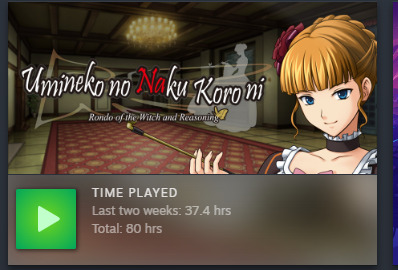
I'll take my "fell for it" award. I'll also take an extra since I've been looking at the epitaph for (see above) hours and I thought that it could have been solved without knowing a different language. Ryūsui Seiryōin and his wordplay continue to haunt me.
(nobody will understand that bit, not even me since I still can't understand Japanese)
The fight scenes met any expectations I had. Mahoyo comparison was ended up very accurate. In the end I still feel extremely silly and abjectly shameful.
Another interesting thing was that the mysteries weren't really that bad, at least until the curve balls at the end. either way I'll try to get there. with something, it wont be a very good something.
Eva is everything I expected of her.
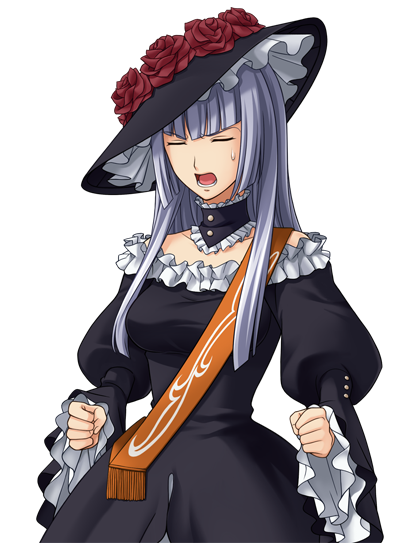
Spoilers I guess, its all devils anyway
As I said the cases where easy. I suppose it was by design, with it focusing on Beato's trick, and EVAtrices cruel methods which don't allow room for complication. the Cat Box allows for mostly infinite solutions so what else was I to do but try to figure out if the individual boards had different killers. Since it was/is clearly Eva but it maybe couldn't have been Eva every other time.
idk what Equal difficulty meant, but it could have been referring to EVA since she is THE WITCH.
speaking of those curve balls, go figure it gets complicated at the servant room again. and its somehow worse, because what do you mean a human murdered Nanjo EVA, what does that mean you can just deny your own existence and then not implode immediately same with 18 people, i just cant fathom what is being missed here, a mid game inclusion? (ignoring Ange) the corpses? since EVA brings that fact up after everyone's dead, & here i thought the curve ball would have been "Eva couldn't Murder George/Hideyoshi" but since everybody gets a Nanaya anything is possible now apparently. who even knows what happened for the first twilight since the concept of an MO was thrown out a window by that point.
yea so I got nothing. no tldr's. What makes it worse is that EVA still said the 'Human could have used magic' in white so she's was still following the rules. its all about as shaky as it was last time for me.
oh yea Ange's cool. still not to sure how Witch's work even after reading about it.
either way I'm going to bed, the me of tomorrow can figure it out.
#umineko when the cry#umineko#umineko no naku koro ni#banquet of the golden witch#you get a nanaya#im going to invent time travel so i can shove Eva down a flight of stairs
4 notes
·
View notes
Text
current to do list for umineko solvings:
Check latter twilights of Turn of the Golden Witch to see about the locked rooms there and just confirm the existing theory
Check tea party of Alliance to formulate a theory about Kyrie’s death since that is most suspect. I think even the storehouse murders can be understood as "well they just like agreed to get killed"
Solve epitaph
4 notes
·
View notes
Text
Umineko Liveblog: Thoughts/Theories [Episode 1 Chapter 14 Edition]
Umineko Chapter 14’s thesis statement was “let’s take these patterns and conventions we’re establishing and blow them all up with gleeful abandon”. Less than an hour from the Second Twilight, we’re forced to bear witness to twilights four and five, and not necessarily in that order. The Witch Narrative is off the rails. The most important character in Umineko to me died, and Beatrice may actually well and truly be real for once. Whatever’s going on here is one hell of a mess.
So let’s try and untangle whatever the hell went down here. The Chapter 14 writeup tour includes the following stops: the hot mess formerly known as the Witch Narrative, Kinzo finally being totally super dead for real, the world’s nastiest most evil twink death in human history (Kanon), identity and furniture and roulettes, Beatrice the Golden Witch’s understated grand entrance into the story, the 19th person conundrum (part 7123748296), and some downright funky stuff happening beneath the story’s surface.
Let’s get this going.
To start, we need to talk about the Witch Narrative. So far, the Witch Narrative has been the term I’ve given to a very clearly established phenomenon and set of actions. When there are characters who have some kind of vested interest in encouraging you to view Rokkenjima as a supernatural incident rather than a crime, then that’s the Witch Narrative. The person painting the magic circles is perpetuating the Witch Narrative. Characters such as Eva and Hideyoshi talking about how frightful and demonic things are is also the Witch Narrative. If you’re thinking “maybe this is Beatrice after all” or if things are aligning a little too well with the worst interpretation of the epitaph riddle, then that is without a shadow of a doubt the Witch Narrative.
So what happened? Kanon being gouged in the chest and also killed mere minutes after the discovery of the torn-apart pair who are close is not right. Skipping to twilight five (for the trolls) straight after number two is not good Witch Narrative etiquette. The sequence of murders and horrors is crucial to authenticating this slaughter as folded within the ritual to revive the Golden Witch and/or reach the Golden Land. Everything so far has dictated that in order for the witch to revive and none to be left alive certain steps must be carried out in a certain order. If this performance is thrown out of sequence for its audience, the song goes funky. Suddenly you’re aware you’re watching people playing pretend on a stage and this world you’re buying into is only ephemeral. If the sequence of deaths doesn’t matter, then this isn’t an occult ritual at all. It is in fact a disguised butchering.
Showing your hand like this this early makes things very difficult for those peddling this narrative. Deaths happening out of sequence takes this from a supernatural force happening beyond everyone’s control to something that could easily done by a human desperate to make everybody believe. If my theories about how this performance is happening ring true, then it becomes infinitely harder for Genji to make any further moves with the simultaneous blow of his most useful pawn kicking it early and the order of events getting all scrambled. How can the stomach, leg, and knee get gouged in a way that still works in service for this narrative now?
Given what I’m thinking, Genji is likely moving on his own now. Kumasawa and maybe Nanjo are complicit in the spreading of the story, but they are almost certainly unable to be as useful to any kind of scheme as Kanon was. They are older, less mobile, less physically able. Kumasawa can scream about magic circles all she likes, but does she have the strength to move and mutilate corpses? Very unlikely. The options to carry things out have been severely limited to an almost unsalvageable degree. Every crime so far has been a type of locked room that works via tricks that could only be carried out by two active parties. Being on your own can only get you so far.
Which leads you to an immediate conclusion: Kanon dying in the basement boiler room was not part of the plan. Or, not part of the Witch Narrative at least. His death marks a point where this scheme has totally gone off the rails, and Genji’s script has been rendered worthless. The presentation of the death is obfuscated, but the truth beneath it is that something went deeply wrong that shouldn’t have.
This is a bold claim I’m making, but I also think I have enough proof in the story to substantiate it. I think, going by everything, the next incident following the deaths of Eva and Hideyoshi was to involve the basement in one form or another. I also think that this was being prepared in parallel with the Second Twilight – Genji and Nanjo leave the kitchen at the same time as Kanon and Kumasawa, but the two men don’t reach the scene until after Kanon has already unlocked the room and Eva and Hideyoshi have been found dead with the stakes in their skulls. Enough time to, say, take a trip down to the basement and set some dominoes in motion.
As to what I think was part of the Witch Narrative, I think everything was on track right up until the moment Kanon set foot in the basement. The foul smell filling the hallway was almost certainly set in motion by Genji and/or Nanjo (perhaps by turning on the boiler while Eva and Hideyoshi were being found in order to time it to make the smell the strongest at the perfect time – this may also have precluded moving Kinzo’s body there depending on where he was before now). Kanon acting bizarrely freaked out was part of the plan. As was Kumasawa screaming about hearing a noise, and the two of them breaking off from the group to rush ahead to investigate. Everything falls apart when Kanon sets foot in the basement and Beatrice shows up and he dies.
So what was the intended plan in the basement involving Kinzo? I think, if I were to hazard a guess based off of pre-existing patterns, the boiler room in the basement was going to be used as another locked room, this time featuring Kinzo. I think this would have been a play in two acts. The first act would have Kanon and Kumasawa chase the noise to the basement and “find” the head’s ring on the ground. The family would search the boiler room and find the back door exit locked up, and no sign of Kinzo anywhere in sight (there would be efforts taken to keep anyone from investigating the boiler). The ring alone on the ground in an empty room would stand in for the Third Twilight – Kinzo is without his headship and authority, so it must therefore fall to everyone to praise Beatrice’s noble name in his stead. Dissatisfied and creeped out, everyone leaves the basement – the back door is locked from the inside, and the front door locked with a key placed in Natsuhi’s possession.
From here, this would likely have led to another discussion chapter about how the ring got there. The setup of the scene would be enough that Battler would question whether or not a nineteenth person placed the ring there, or if Kinzo himself actually dropped it there as part of some other ploy. The servants would be questioned and swear up and down there was nobody else in the basement when they entered. The sound would be discussed, as would the impossibility that anybody known to be alive could make that noise. The conversation would then turn to Kinzo as the likely suspect and Natsuhi, who’s been complicit in covering up Kinzo’s death for some time already, would start sweating as this truth grows closer to being uncovered. It’s up in the air as to whether or not the servants would help or hinder Natsuhi here, but I think it’s likely Battler would have started to think on Eva’s words from earlier. More fuel on the Natsuhi culprit fire that she can’t fight because she can’t admit to knowing what he knows. Maria would then cackle and say to everyone that this is obviously Beatrice manipulating things with her magic, and boom, scene.
Something would then happen in the next chapter to turn attention back to the boiler room. Perhaps the smell grows stronger. Perhaps the conversation about Kinzo grows to a fever pitch. Perhaps a servant fakes hearing another noise from the basement. Whatever the case, we would return to the boiler room a second time. There would be a point made of showing Natsuhi pulling out the only key to the boiler room and everyone stepping inside to find Kinzo’s body on the floor, burned up with an icepick stake in his forehead. The inner lock for the back door would still be set. Genji and Nanjo would confirm the body’s identity via the polydactyly. Somehow, Kinzo’s dead body appeared in the middle of a perfectly locked room.
Likely there would then be discussions of who could have killed Kinzo, given that at the time of his “death” everyone was yet again together (minus Kanon/Genji slipping in and out of the parlor to get food and drinks). The assumption would be that Kinzo was alive in there all along, and then killed himself for some reason – contradicted by the fact that if he launched himself into the boiler, how did he drag himself back out into the middle of the floor? The mystery would stump Battler, because the only major solution would be to assume a nineteenth person was also already hiding in the locked basement, and killed Kinzo and displayed the corpse, but Battler would chessboard himself out of leaning on that option. Out of options and stumped, we would stay at another stalemate where there’s no proof that Beatrice exists, but no way that the surviving humans could have set up this scene (there are of course ways, such as a back door that wasn’t really locked or a second key/master key with which to return to the boiler room and set things up, but nobody will think of them). The horrors would escalate. The Witch Narrative would persist. And so on. And so on.
This scenario, believable as it is, never came to happen. Instead we got what we got, and we need to figure out why. Why did Kinzo show up like this? Why did Kanon die, despite all known logic and reasoning stating that the contrary would be ideal? Why are things speeding up at such an exponential rate? I think we can get a good shape of what was supposed to be with Kinzo, but understanding what happened with Kanon is almost certainly the linchpin driving this deviation from the Witch Narrative.
So, let’s review: Kanon and Kumasawa head to the basement after “hearing a noise” that nobody could have possibly made. Kanon speeds off ahead of Kumasawa and encounters… something in the boiler room. He has a conversation with this something and comes to a revelation about his status as a human being, and then he gets gouged in the chest and killed. The presentation is straightforward: Kanon sees butterflies in the boiler room, he identifies it as Beatrice, he stands in defiance of her, and dies as a result. Except, of course, that it really isn’t that simple at all.
The tonal shift is introduced through the phrase “a fantastical scene”. Fantasy has been a phrase thrown about a few times in the story so far by characters in reference to very specific things, people, and concepts. The siblings call Kinzo’s story of the gold ingots “fantasy”. Beatrice is “fantasy”. The occult symbols around Rokkenjima are “fantasy”. Maria’s behaviour is “fantasy”. Straight away, we can draw parallels between the use of the word “fantasy” and the term “existence”. To be fantasy is to “exist”, is to be something that is propped up by narrative and belief irrespective of the material reality.
In that case, what does it mean for a scene to be fantasy? In a story about storytelling and about fantasy and about “existence”, there is surely nothing accidental about the prose describing a series of events as “a fantastical scene”. Two things are immediately happening here. The first is that we are stepping into the framework of fantasy, of belief without proof and immateriality fuelled more by ghosts than flesh. The second is that we are entering into a self-conscious scene capable of describing itself as such. This is a narrative unit that knows what it is, a story told by a teller with an agenda.
I think to explain what’s happening here, it’s worth circling all the way back to some of the metafictional stuff I was entertaining back before people started dying. More specifically, the notion that there are narrators with agendas involved in the construction and presentation of Umineko. This is most passively seen in the less-reliable third person scenes where we can be shown metaphor and falsehood to convey a deeper emotional truth – Kinzo has most likely been dead all along, and yet he has also made numerous appearances in his study over the weekend of the family conference. However, the “fantasy” of these moments is never explicitly highlighted. These scenes are a type of “fantasy”, but not a fantasy that you need to be told is the case. You can understand Natsuhi and Genji’s hearts and feelings towards Kinzo regardless of whether or not you think the family head is alive or dead.
Here, though, to be directly told you are witnessing a fantasy is tipping the scales. The arbitrator of this fantasy, of whatever might be going on in the narrative beyond the framing confines of Rokkenjima, is much more actively and directly introducing the concept to Kanon’s final moments. On their own, they would be in the same vein as whatever was happening with the Kinzo scenes if a little more heavy handed and obtuse, but we are not left to puzzle out whether or not we can trust what we are seeing. We are told outright this is fantasy. We are forced to acknowledge from the outset that there is something untrustworthy and unreliable about this chunk of the story.
Why?
I think that this is glaring evidence of some kind of discrepancy between the narrator(s) and the actors in Umineko. Something happens in the boiler room which the narrative feels the need to paint over with a depiction of swarms of butterflies and cackling murderwitches – the need to plaster fantasy over this scene matters more than upholding the story’s rule that Beatrice remains a possibility in shadow. Just as I argued that the Witch Narrative went off the rails here, I think the same thing applies to the Umineko Narrative as well. If there’s a metafictional “game” going on here, then Kanon in the boiler room knocked that off kilter, too. The zero on the roulette threatened to ruin not only “Beatrice”, but also Beatrice and also the fabric of the text itself. Whatever Kanon did or almost did rattled a lot of people all at once.
But what is this thing, actually? What we’re shown is Kanon having enough of being bound to the whims of Kinzo and Beatrice and their bastardised excuse for “magic”, and him deciding as a result to abandon his position and furniture and ruin the demon’s roulette in motion. In real terms, this is hard to parse as meaningful outside of its fantasy context. Kinzo, as we know, is not the one setting the roulette in motion in the way we’re led to believe. Beatrice is a dubiously-extant entity represented by so many different people wearing her name instead of a concrete person. Magic is anything belonging to the realm of metaphor or anything that happens on a non-material level. And the Demon’s Roulette is the catch-all term for the epitaph ritual, the Witch Narrative, and maybe also the layers of abuse going on on Rokkenjima.
The only term that has a direct material representation is “furniture”. Luckily, this is probably the most important part of Kanon’s moment of defiance, so it is extremely fortuitous that we can more easily define furniture in a way that makes sense in order to more deeply understand what’s actually going on here.
To recap, “furniture” is the label applied to servants on Rokkenjima within Kinzo’s inner circle. Three servants in the story use this label – Shannon, Kanon, and Genji. From Shannon’s backstory that we got in chapter 8 during the proposal, it is very likely that “furniture” is a term foisted upon the teenage orphan servants that come and go on Rokkenjima as a kind of degrading, abusive brand. We see this most keenly through Shannon, who submits to Battler’s sexual harassment because she is furniture and thus lacks the will to deny anything. These vulnerable abused kids are forced into a new name and a new role where they are little more than living objects for people more powerful than them to use and abuse as they see fit. To be furniture is to be totally under the thumb of Kinzo’s abuse, serving those needs even when it goes against all morality and all that you are.
Genji’s positioning with the label is less clear, given that he was, at some point at least, on more equal footing with Kinzo. It is likely that Genji adopted the “furniture” label for himself as a kind of expression of his feelings – he is nothing more than an extension of Kinzo’s will, and all he does is in service of his master. He does not have a life outside of servitude. However, the difference here is that Genji willingly stepped into the label versus Shannon and Kanon who had it forced upon them. To an outside perspective, this creates an unfair impression of equality between the three of them, when Genji absolutely has more material autonomy and personal rights than either Shannon or Kanon. Genji feels bad about Kinzo and about how all he can be to the man is his butler. Shannon and Kanon are cruelly abused and dehumanised every second of their lives. It is a false equivalency. The only commonality here is that to be “furniture” is to occupy an undesirable position within hierarchy.
Under this light, Kanon’s declaration that he is no longer furniture can immediately be read as Kanon deciding in that moment to cease existing as an object to be used by people with more power than him – power “exists”, and in a closed environment ruled by fantasy, power can be denied with more ease than would normally be available. Kanon decides he is no longer an extension of another’s will, but instead his own person. He decides this because Shannon is dead, and the least he can do is take revenge against the systems that killed her.
That said, such an explanation is deceptively simple. If denying your status as furniture comes when you cease to adhere to the whims of power, the boiler room scene carries with it the implication that this is the very first time Kanon has done anything of his own will. Kanon has been deeply involved with the Witch Narrative thus far, and if this scene is to be trusted then this is an admission that he has had zero autonomy in the prior events. Or, to expand this further, Kanon is not where he wishes to be and is only now realising this desire. He steps out of his role as a pawn in the augmented fiction around him, and Beatrice kills him for it.
You can view this as happening on multiple layers, each one perfectly able to feed into the “fantasy” hanging over everything. On the level of the Witch Narrative, this is Kanon partaking in an act of defiance and getting killed for it. On a more abstract level, this is Kanon threatening to ruin Umineko and being taken out of the story as a result. To be killed by Beatrice so explicitly comes with much deeper ramifications given the state of Beatrice's presence in the story thus far. If a ghost-myth-metaphor appears in the flesh to kill you and turn you into a prop for the next part of the story, what does that mean?
It was not enough for Kanon to just die. He had to be gouged and killed and transformed into the victim of the next twilight – you can easily make the argument that under the terms of the story being turned into a gouged/killed victim is yet another, more severe form, of being rendered furniture. With the Ushiromiya siblings, this concept can easily exist as a form of poetic irony – these powerful abusive individuals are all left as butchered pieces of furniture to be used and deployed however Beatrice sees fit. You are never as powerless as you are when you're a mangled corpse being manipulated by your own killer.
Except Kanon was already furniture – in his own words, even, this is a servitude that applies to Beatrice as much as it does Kinzo. The reversal of fortune works less well on Kanon; his death is an act of rebellion that is transformed into a reinforcement of his inescapable position. He tries to become human and fails at the first hurdle, and thus goes from being furniture to once again being furniture.
I think this situation is worth examining through the lens of the dichotomy of self framework to yield more information. To recap, almost everybody in Umineko struggles with the gap between who they want to be and who they're forced to be. This is a near-universal constant, seen with Natsuhi as much as it is with Shannon. Everyone desperately desires to be somebody else, and hardly anybody can reach this dream.
Kanon is a curious wrinkle in this pattern in several regards. Up until now, as a servant Kanon has been markedly less furniture-like than Shannon. At every turn he has been prickly and begrudging and making no secret of his own feelings to himself, unlike Shannon who leaned so far into the mask she ended up cutting herself off from herself. With Shannon, Sayo almost certainly feels more complicated and unpleasant emotions, but this is completely partitioned off from her servant self. With Kanon, there is an emotional authenticity to his character, but unlike Shannon, Kanon's “Sayo” is nowhere to be seen.
Kanon is not trying to become his desirable self. He is attempting to transform his undesirable self. Where Shannon/Sayo was looking for an exit from being furniture through George, Kanon's actions promise no such escape. He never discards his furniture name, only the label. Kanon does not multiply himself. Kanon reduces himself into a singular concentrated point within the story.
To Beatrice, an entity that thrives on multiplicity and iterative selfhood, an individual who not only defies her rule of power but also eschews his own identity complex in the face of self-actualisation would be something to be loathed. In Chapter 14, Kanon stands for everything Beatrice is not: painfully human, and painfully material.
By rejecting the status of furniture, by holding true to the only name he’s gone by in the story, Kanon is fraying the edges of the hard rules of the fiction governing Umineko. Everyone in this story is duplicitously in tension between their perceived and ideal selves. This tension allows for a rife breeding ground for secrets and uncertainty. This grey area turns everyone on Rokkenjima from human beings into murder mystery characters. This nebulous state of being is the genesis for “existence”. This is how Beatrice asserts dominion.
Kanon chooses a position that is neither, essentially queering the witch-human dichotomy. He is not Kanon the performer in Beatrice’s narrative of magic and murder, but nor is he Kanon the servant in Kinzo’s narrative of power and abuse. His moment of empowerment coming as it does throws all this off the rails, just as this sequence of events throws the epitaph ritual off the rails.
Kanon, in real terms, deals a potentially fatal blow to the Witch Narrative through his “zero on the roulette” gambit, and Beatrice’s only recourse is to clumsily plaster over this act of rebellion with fantasy before any Detective-oriented observer can bear witness to what could be this entire pantomime’s undoing.
However, what happens in the boiler room is not a simple act of metafictional housekeeping. There is a strong and prevalent sense that whatever Beatrice does, she does it spitefully. Shortly before Kanon’s death, there is a bizarrely=presented exchange between himself and the witch, curious for myriad reasons.
Two things which immediately stand about the moment in question are firstly that this serves as our introduction (allegedly) to Beatrice’s presence in the story, and that it tips us off to the fact that there may be an element of hypocrisy to the impartiality of the so-called indiscriminate murderwitch. Kanon’s reward for his defiance is subjecting the Golden Witch Beatrice to the mortifying ordeal of being known, and so we owe it to him to see what we see when the curtain is tugged at even just a little bit.
The immediate thing which jumps out is that Beatrice addresses Kanon not with annoyance, but with loathing. There is something personal and vindictive about the retribution she inflicts upon him. It’s not enough to simply kill him with the stake and set up another Twilight; there is a mockery and a derision. Before Kanon is killed by Beatrice, Kanon is made aware of how much Beatrice hates him. The why in the moment is mostly clear - Kanon threatens to undermine Beatrice’s narrative, which applies simultaneously to all Beatrices and all narratives in play - but we are told in as many words that this rage is specific and personal.
Earlier, we have a comment from Kanon that he refuses to be led astray “again” by either Beatrice or Kinzo which is. Interesting and revealing wording to say the least. Especially when we try to consider who the person behind Beatrice may be in this scene.
If, somehow, we had confirmation that the Beatrice in the boiler room was a metaphor for Genji, then this exchange would make more sense. Kanon the begrudging accomplice making one act of rebellion too many, and Genji’s facade of professionalism slipping to show a hint of what may be true emotions below the surface. Except Genji is not in the basement with Kanon very much on purpose, so whatever materially happened to Kanon did not directly involve Genji, the most likely living target for these emotions.
It’s not even worth pretending Kinzo is alive enough in this moment to not only hear Kanon’s words, but also respond. Even in my initial hypothetical “narrative-compliant Third and Fourth Twilights” outline, for any of it to work Kinzo has to be dead at this moment. And more than that, Kanon specifically makes sure to distinguish between Kinzo and Beatrice in his speech. He has not only been led astray by Kinzo, but also by Beatrice. In this interaction, to Kanon, Kinzo and Beatrice are separate entities.
So the question becomes, as it has been from literally the start: who is Beatrice?
I don’t think it’s possible to answer this question in the direct sense of “what is the identity of the person behind the witch that killed Kanon”, but I think we can explore “what this figure we are calling Beatrice like as an individual?”. The Detective’s truth on the matter remains obscured to the point where any guesses at this point would be meaningless, but the Romantic’s truth remains a valid option. We don’t need to unmask Beatrice to get a sense of her character.
What we know about Beatrice in this chapter is thus: she appears via a cloud of butterflies, she is associated with the fantastical, and she makes the active choice to kill Kanon and wrap his death into another Twilight. From this, we can extrapolate a few things: this Beatrice operates at least in part in adherence to her own mythos, even if she doesn’t necessarily strictly uphold the Witch Narratives in the terms that the culprits have set out. She is not in total alignment with whatever scheme is going on with the Witch Narrative, and she has on some level a personal, spiteful disdain towards Kanon.
When Beatrice kills Kanon, she puts him down as the “furniture” he is. When he attempts his self-actualisation, there is a moment where the narrative insight we get into Beatrice condemns him as foolish and futile and vulgar. It is not simply annoying that Kanon is stepping out of his role. It actively repulses Beatrice on some level. From what we get of Beatrice, there is the impression that Kanon’s decision deeply violates some kind of taboo to the point where Beatrice’s mode of operation leaves the fantastical and dips into the visceral, even if only momentarily.
So what we can claim to learn is that there is something irreparably offensive to Beatrice about people stepping out of the confines of their pre-ordained roles, which is something incredibly interesting to consider. She holds a deep loathing towards Kanon for daring to defy his fate, more so than someone like Genji would if this were a mere case of Kanon messing up the Witch Narrative. Beatrice takes Kanon’s transgression personally, not in the sense that this is a specific attack on her, but in the sense that it upsets her sensibilities more than anything else could.
So why would that be? What about some small little servant choosing to throw off his symbol of abuse and oppression is so offensive to a mighty witch such as Beatrice? She’s centuries old, an accomplished alchemist, and brimming with supernatural power. According to all we know of the Beatrice mythos, she should be able to toss Kanon aside with a snap of her fingers. But there is a mockery towards him, a taunting and a toying coming from a personal degree of loathing.
I wouldn’t go as far as to say that Kanon got under Beatrice’s skin, but it’s something close. She takes something out on him for his transgression towards her - in his speech, Kanon marks out both Kinzo and Beatrice as individuals he is defying, and that has to be important. It’s clear to see why a furniture servant abandoning the degradation would upset fascist abuser supreme Kinzo, but what about this would be so upsetting to Beatrice? Why would she care at all?
I have some idea, but to elaborate on that I first need to talk about one other curious feature of Beatrice’s presentation in this chapter. She has as tangible a presence as you can get in this chapter, except for one detail: in her “conversation” with Kanon, Beatrice never actually speaks. Her “dialogue” is relayed through the narration and through Kanon’s own responses, but Beatrice herself remains voiceless.
The immediate effect of this is that Beatrice remains in obscurity even as she shuffles around the spotlight. We know in this chapter that she gets mad at Kanon and kills him, but we don’t get anything concrete about Beatrice. No face, no voice. In other words, Beatrice is not given an active presence in the story. She is relayed to us second-hand, even though she plays a crucial role in the events in the boiler room.
There is something to this beyond the benefits to the mystery narrative that keeping Beatrice obscured entails. Of course this presentation keeps us guessing about several elements of Beatrice’s existence - we can’t say either way what Beatrice’s physical form looks like or what it could mean. Revealing Beatrice definitively as either a human or a witch would run counter to Umineko’s narrative worse than anything Kanon could ever dream of.
However, that does not necessarily mean that the only way Beatrice could have appeared in this chapter was in this way. It’s not enough that she’s a hidden presence. She’s also a passive one. She performs no direct action. She never directly tells us anything. Beatrice is kept in check by the narrative as a spectral entity. The only “active” thing we see of Beatrice happens to be her own feelings towards Kanon’s desperate stance.
Beatrice is held in fantasy and only fantasy. The one exception to this is still little more than a gesture at Romantic examination. Beatrice has no tangible, material, Detective’s presence to her. Even in death, Kanon’s murder is not described as someone plunging the stake into him. The stake appears and he is impaled by it - passive voice for emphasis. The only “active” step taken in the death sequence is when Kanon pulls the stake out of his chest. Nothing is directly manipulated by Beatrice’s hands.
Technically, we can’t actually say Beatrice does anything in this chapter. This is something that in truth ties into the broader presentation of Beatrice as a figure in Umineko. Going by the stories told by the servants about Beatrice beyond the Witch Narrative, there is a common thread in all these tales: Beatrice shows up and then something happens. Even in Shannon’s story of the injured servant, her tale is not “Beatrice pushed the servant down the stairs”. It is “a servant disrespected Beatrice and then fell down the stairs”.
There is a very understated and very curious denial of agency seen with Beatrice, on reflection. All she’s really allowed to do is sit there as a cloud of butterflies and be an emblem for misfortune happening that is later accredited to her. I’ve referred to Beatrice as a murderwitch throughout this liveblog, but what’s interesting is that while this reputation is there, we aren’t ever shown more than the reputation itself.
The excuse so far has been that the literal witch Beatrice has been unable to do anything on account of needing to be resurrected in order to return to the material plane first. But even that narrative is something contradicted to the point where it can’t be trusted. Kinzo’s scenes make it clear this is all an attempt to summon Beatrice from a place nobody can normally reach, yet he is also convinced in some scenes that Beatrice is already there, watching him with amusement from the sidelines.
This could be explained away with the whole “Beatrice lacks a physical form and thus she isn’t really there” line of reasoning, except that in chapter 14 she appears to quite literally orchestrate Kanon’s death, and prior to that she allegedly had the means of injuring a servant who disrespected her. How can Beatrice cause harm to servants and yet also be so far removed from the physical world that a violent occult ritual is needed to ensure her presence?
Beatrice is not there, and yet Beatrice is there. In other words, Beatrice “exists”. It’s not just that Beatrice “exists” but that the act of being Beatrice is to inherently inhabit a position of “existence”. Beatrice is a passive entity, strictly defined by indirect non-involvement.
In other words, from a certain angle, Beatrice The Golden Witch is just as restrictive a role as “furniture”. To be Beatrice is to be unseen, voiceless, inactive. No matter how much you may feel or hate or rage you are not given the cathartic release of wrapping your hands around someone’s throat. For all her loathing of Kanon, the only tool at Beatrice’s disposal is to continue to perpetuate her own myth-narrative, merely folding Kanon into the pattern. And at this stage, the Witch Narrative is more akin to a process than a personal action. There is something very distanced and abstracted about killing for the Twilights; it is about continuing to engage with the horror-mystery and not about yourself and your own feelings.
Even through the metaphorical allegories of Beatrice this mode is seen. Genji is bound to the role of Beatrice, defined as his tragic and terrible devotion to Kinzo. Genji couldn’t have escaped this fate if he’d tried. Kanon is coerced into upholding the Witch Narrative through his position as furniture, thus conflating both states of being into one and the same thing. Even further back, whoever is behind the story of the alchemist that gave Kinzo the gold is reduced to a portrait of a white woman in the mansion’s hallway, stripped of everything but a confining ideal. To be Beatrice is to be contained by other people’s demands and expectations.
When it’s laid out like this, it is no surprise that Beatrice reacts to Kanon’s rebellion with outrage. This choice is the one thing she can never do because her whole existence as Beatrice is predicated on that not being an option. Beatrice, no matter the form she takes, is trapped in her role. To cease being trapped by the role of Beatrice is also to lose the power granted by being Beatrice. She is the demon’s roulette. Anyone who risks becoming something more than their assigned category is anathema to her entire nature.
Kanon rebels against Kinzo’s will where Beatrice never could. No wonder she kills him for it.
But, of course, now we need to think about how Beatrice actually managed to kill Kanon in the first place. And to do that we need to revisit the next most obvious from the start question: how many people are on Rokkenjima?
The 19th person issue is one that at times feels too blatant to give more than a cursory amount of attention to: there are nineteen people “existing” on Rokkenjima because Beatrice is an immaterially real shared identity construct. There only being eighteen physical bodies is irrelevant to this count - the number of “people” increases further if you start thinking about people’s multiplicitous selves as their own entities. Witch Maria and Human Maria, adultsona George and kidsona George, Shannon and Sayo, Natsuhi and Ushiromiya Natsuhi, et cetera. Beatrice being an additional facet of the peddlers of the Witch Narrative is merely this mechanism brought to an extreme point.
Except, cutting past all the fantasy and obfuscation, Kanon does still in fact get killed in the boiler room. At the time of this murder, either eight or nine people are already dead by this point. And of the eight other survivors, seven of them very conspicuously are not in a position to murder him at all.
So this dilemma boils down to a singular issue: either Kumasawa killed Kanon, or a nineteenth individual did. The story goes to great lengths to ensure that this is the setup we’re working with here. Where Eva and Hideyoshi were allegedly killed in a way only a witch could have done, Kanon could have only been logistically killed by a witch and nobody else.
There is of course a third angle here, and that’s that Kanon killed himself. It’s technically an option on the table, but one I am not sure has much, if any, basis. The entire scene hinges around Kanon choosing to act out in defiance in a space devoid of observers. There is nobody save for the reader for Kanon to convince of the authenticity of his words and motives. For this premise to work, it would almost certainly necessitate a level of metatextual awareness from Kanon that we have not seen at all.
Kanon acts and reacts to a threat in the room. Kanon makes it clear that his goal is to take this person down with him if he can’t save himself. Everything points to there being a second person in the room with Kanon capable of inflicting harm on him. A person that would, then, hypothetically, flee out of the back door and into the night before being found.
At this point in the story, even Battler is fairly on board with there being a 19th person moving around on the island. After all, nobody among the group of survivors could have been responsible for killing Kanon, save for maybe the incredibly frail Kumasawa. The options are pared down to Kumasawa, suicide, or a 19th person. This person’s identity is unknown, but the fact of their existence is, on the surface of things, pretty undeniable.
This, however, feels like a trap. The existence of a 19th person is part and parcel of the Witch Narrative. To readily agree that there is a 19th person on the island is to buy into the same immaterial theatre spawning the magic circles and the demonic stakes and letters speaking of alchemy. You either accept all of it, or you accept none of it. It’s already been established that the occult artifacts at the murder scene are little more than decoration placed by somebody doctoring the bodies. If this fact is true, then the existence of a nineteenth person must therefore be false.
But if Kanon was murdered by somebody, that somebody was not among the eight survivors. Thus the contradiction making this yet another “impossible” mystery. The only two points of data we have are totally irreconcilable.
Save for one read on the situation: Kanon was killed by somebody outside of the group of survivors, and this individual is also not a 19th person. There is exactly one way in which this can be true, and that’s to consider the possibility that the person that killed Kanon is among those presumed dead.
This is something that’s not impossible. The obvious objection is that for a person who we think is dead not being dead is that that would invalidate the epitaph murder ritual, but we’ve already established that the sequence of events only has value as far as convincing the survivors of something inescapably occult. If twilights can happen out of order, then there’s no reason why we need to assume that a victim has to actually be dead. It’s all about the affect.
If this were true, it would allow somebody outside of the group to move around and kill without disrupting the premise of the eighteen on Rokkenjima. This would mean that Kanon’s killer is one of the victims of either the first or second twilights.
From the outset, both pools of suspects are problematic. Eva and Hideyoshi, even if they weren’t dead somehow, were both physically in the guest room at the time of the murder - there’d be no way for either of them to sneak by the others down into the basement to kill Kanon. The six on the first twilight, beyond being mangled past recognition, are stuck within a locked room to which only Natsuhi has the key.
I still think that if we’re to entertain this possibility, the culprit must be one of those assumed to be inside the garden storehouse. Which means we’ll need to interrogate the function and construction of this reverse locked room.
It’s an established fact that the shed is locked from the outside. It is also an established fact that there is only one key, and this key is held by Natsuhi who has not had a single meaningful opportunity to sneak off and unlock the storehouse.
The only way to interrogate this setup without contradicting the physical facts of the story is through a Detective/Romantic examination of chapter 10’s narration. What we know are the above datapoints. Everything else is extrapolation and assumption, especially if we abide by the non-Battler POV = Romantic obfuscation logic.
So, extending that line of thinking leads us to distrust anything that can’t be immediately verified by the scenes in the parlor. The most crucial fact, and the one that the argument I am making hinges on, is that everybody that was killed still being in the storehouse when it was locked up cannot be trusted with absolute certainty. The only people on the scene during the locking of the storehouse were those involved in the Witch Narrative to some degree, and Natsuhi, who by her own admission could not stomach to look upon the scene for longer than necessary.
Who is to say that, during this period of uncertainty and unreliable perspective, somebody playing dead inside the storehouse slipped out while Natsuhi was looking away in disgust? This would facilitate the existence of an individual who is not part of the group of survivors, yet who also does not contravene the 18 person premise.
There are holes in this, of course. It’s a huge leap to assume that Natsuhi somehow missed a whole person getting up and leaving the storehouse, and there are numerous questions as to how the narrative-peddling servants would permit someone to roam free who would then later betray the occult illusion and murder Kanon. But the basis of this theory is not impossible, so perhaps there are ways to work around this.
We already know Natsuhi’s perspective is highly unreliable, as proven earlier in that exact chapter. She so desperately wants to hide the fact of Kinzo’s death that she starts to buy her own lies, having imagined hallucination conversations in a most likely empty study to verify her own beliefs. If brain ghost grandpa can “exist” through Natsuhi, then it is much less of a stretch for her to willingly or unknowingly let something like this slip. Maybe she was in her own head. Maybe she tuned it out in an act of extreme denial. Either way, it is theoretically possible for Natsuhi to overlook something that big.
As to the servants permitting this, the obvious answer is that this person was allowed to let go as a contingency by Genji in the event of a Witch Narrative stalemate. An additional body roaming around that the audience of this theatre has already written off would be a huge boon in authenticating his own crimes. This person killing Kanon, then, would not necessarily be the end of the world for Genji - as per maybe-Kinzo’s words regurgitated through a hallucinatory phantom, total annihilation is as valid an option on the table as any other outcome. A roulette can land on many outcomes, and an “impossible” killer taking Kanon out transforms this individual into Beatrice in the consciousness of the survivors, furthering the plan either way.
Given that, the question then becomes: which of the dead six could theoretically do this? Who here would pretend to be dead, skulk around the island for a time, and then end up killing Kanon?
I think there are a few suspects we can eliminate off the bat. Krauss and Shannon, the half-face corpses, most likely don’t fit here. As individuals, it does not track with who they are to imagine them acting this way - going by my theory, this would place Krauss as someone who played possum to survive his own assassination attempt backfiring on him. There is absolutely no way that someone like that wouldn’t have immediately come out of the shadows to expose Eva and Hideyoshi; Krauss didn’t even have it in him to keep his embezzlement bragging on the downlow. As for Shannon, the victim in this situation is Kanon. There is absolutely not a single scenario in which Shannon would kill Kanon for any possible reason - he is probably the only person in her life towards whom she feels unconditional love and trust. We’ll never know for a fact how Shannon/Sayo felt towards Kanon’s desperation to save her, but even in the most emotionally complicated interpretation, it still makes no sense for Kanon to be killed by her in retaliation, and it makes no sense for Kanon to have done anything he did in the intervening twilights had Shannon actually survived somehow.
More than that, I have always thought that Krauss and Shannon’s faces being half-destroyed is as close to cast iron proof as you can get that they are definitely, totally, for real dead, for the simple fact that a mystery story’s base assumption is that anybody with injuries that buck the trend are suspicious. Instead, I think this is more likely a case of a tree hiding itself in a forest.
Which turns our attention to the three failsiblings and Gohda. It’s not Gohda, because narratively it makes sense for Gohda to be as much of a victim of circumstance as Shannon in the end despite his bullying of her - middle manager and minimum wage worker alike are insects before the CEO. His abuse of a shred of worthless power cannot save him, therefore he must be dead. Rosa, likewise, would not work narrative-wise to survive. She had a complete character trajectory highlighting the revolving wheel of abuse within the introductory chapters. Her character was never destined for anything more than being doomed by the systems she never managed to do more than perpetuate - surviving the First Twilight would give her licence to try to escape the cycle, which would undermine the whole point of everything that came before.
So we’re left now with two candidates: Rudolf and Kyrie. Both of whom are understated characters with ulterior motives that were never fully elaborated on before they met their ends. Kyrie’s conversations with Battler hinted at the existence of a strategist’s mind with a scheme of her own separate from the gambit Eva strongarmed everyone into going along with. Rudolf, meanwhile, has the lone dangling thread of his “tonight I think I will be killed” comment, the sole thing that, as of this point in the story, we have no clue as to what he could have really meant by that. All we can glean is that the “murder” comment was most likely not a literal portent, but a fear of his that whatever secret he carried would see many people turn against him - either way, there is a Big Thing with Rudolf that never got elaborated on at any point ever.
For this reason, and a couple more, I am inclined to think that if there is a person playing dead, then that person is Rudolf. It would give us room to explore this abandoned plot thread, and it would create a full circle parallel with the comments earlier in the story about how much Rudolf acts like Kinzo - the dead father pretending to be alive, the alive son pretending to be dead. And more than any of that, more than any narrative or thematic reason for this working, is the fact that there is something associated with Rudolf that has otherwise only come up with the discussion of dead bodies.
I am, of course, talking about makeup.
There is a point made of highlighting that Rudolf wears makeup in the earlier chapters as a means of highlighting his superficiality and vanity. He is the pervert covered in glamour. He is, quite literally, bringing a false face to the family conference. Rudolf’s face, his true self and his secrets, have been concealed from the start. Makeup as an image is tied to Rudolf and used as a reinforcement of the fact that this man is not to be trusted.
The word “makeup” is also used in exactly one other context: the mutilated bodies. First we are told that all this gore has ruined the immaculate makeup on Rudolf’s face, and then further down the line we are treated to the description of blood described as "makeup” plastering the corpses. It’s a very curious word to throw into Battler’s panicked monologue, incongruent enough to stick in your mind more than most details.
Given that, it is not much of a stretch to assume we are seeing the literal masquerading as the figurative - this is the whole MO of the Witch Narrative, after all. In a sea of real blood and guts, who would notice that one person in the group was instead pained with makeup? We already know that there is an artificial substance in abundance on Rokkenjima that can be used to mimic the appearance of blood - if it can be painted on doors to create the illusion of a magic circle, then surely it can also be painted on a human face to create the illusion of a corpse.
So in this scenario, Rudolf sits pretty and painted in a sea of bodies, and slips out at the last possible moment. He then hangs around somewhere unseen for a while, before being the one to murder Kanon.
On several levels, this makes sense - whatever schemes Rudolf and/or Kyrie had cooking were derailed by the Witch Narrative, and as someone firmly cemented in the Ushiromiya hierarchy his first instinct would be to take it out on Kanon. This would serve as an explanation for the loathing and disgust conveyed by Beatrice in the boiler room scene, but it does still leave several elements unanswered.
If we assume the Beatrice stuff to be a fantastical plastering over a mundane killing, then we need to ask why Kanon would think and say the things he does if the person before him was Rudolf. Rudolf is emblematic of several kinds of power and abuse, but he is not directly a literal or metaphorical figurehead for Kanon’s oppression. Rudolf is most Kinzo-like when his face is full of makeup - it is an insincere mask with no substance to it. Rudolf is someone Kanon only sees once a year. It makes no sense for Rudolf to be someone Kanon feels the need to take a stand against like this. Rudolf doesn’t really have it in him to be a satisfying Beatrice.
Unless, of course, something changed during the time the surviving Rudolf was off-screen. There are eight whole hours he is unaccounted for. Enough time, perhaps, for someone dedicated enough to solve the epitaph and learn of whatever grim truths lie alongside the gold vault? Perhaps something that relates to his final unspoken secret? There’s still a lot of ground to cover in that area. There’s every possibility the answer lies there, that somewhere down the line we’ll find out how someone could so easily embody a Beatrice position.
That said, this is not the only option for explaining things. Beyond the idea of bodies not being dead and blood makeup and failsons turning into witches, there is something else very weird that goes on in this chapter that absolutely needs looking at, and might even take us to a stranger place than that.
Structurally, chapter 14 is strange. It is a chapter with several oddities - the appearance of the otherwise ephemeral and totally unseen Beatrice, and it is a chapter without a defined timestamp. Every other chapter in Umineko tells us when it happens and goes out of its way to make sure it doesn’t tip its hand too soon with the Beatrice enigma. So for Kanon’s death chapter to feature a lack of time and an abundance of butterflies and other witch-related happenings is more than a little suspect.
Namely because this is not even the first time this has happened in this story. There is one other chapter in the story which deprives us of a timestamp and shows us a golden butterfly, and that’s chapter 9. Which is also, curiously and alarmingly, Shannon’s final chapter.
I spent a lot of time going over chapter 9, highlighting the strangeness of its structure and what that could mean. My conclusion at the time was that we were witnessing something doctored and unreal - to borrow terminology I’ve learned since, my conclusion was that chapter 9 was a “fantastical scene”. I also spoke about how Shannon and Kanon have the curious quirk of being the only ones to ever actually see with their own eyes evidence of Beatrice’s existence, a fact which continues to hold true even in chapter 14.
Now, you could argue that this “disruption” is evidence of the metatextual ripple effect Beatrice’s manifestation is having on Umineko’s reality, but even that wouldn’t be a satisfying answer, because there is also one other time Shannon and Kanon have had structurally identical scenes, and that example was completely devoid of any hints of Beatrice or magic.
Way back at the start of the story, Shannon and Kanon have basically the same introduction scene: they awkwardly present themselves before the family, they fumble their duties and drop something, one adult berates them while another adult berates the first for being too harsh on them, Battler makes the same comparison to a waitress dropping a fork for both of them, and then they have a debrief scene afterwards that hints at deeper, more complicated feelings towards the situation.
Shannon and Kanon enter the story using the same narrative beats with a slightly different retexture. Shannon and Kanon also leave the story using the same narrative shape with a slightly different retexture.
Both walk off on their own going directly against their assigned duties - Shannon heads to the mansion instead of the guesthouse, and Kanon runs off on his own instead of sticking with Kumasawa. Both have a conflict between their “furniture” and real selves - Shannon calms the Sayo inside her to prevent causing a scene, and Kanon attempts to cast aside his furniture role in order to directly cause a scene. Both witness glowing butterflies on their own in a dark corner, and both are heavily implied to have been directly murdered by Beatrice more than any other person in the story. The only difference is that for Kanon, we see it happen, and I can’t help but wonder that had chapter 9 been a full length chapter that we wouldn’t have seen something very similar unfold with Shannon.
This is yet another heap of stuff to add to the pile of “weird parallels and symmetries between Shannon and Kanon” that keeps growing throughout the story. This still isn’t even really touching the bizarre relationship they have to Beatrice and all the ways that that’s played out - both having the ghost story in common, both occupying an odd proximity to the role of “Beatrice”, Shannon as vessel and Kanon as performer. There is a lot of this kind of stuff swirling around the two of them, and I think it really comes to a head with Kanon’s death.
After all, one way of reading this chapter is that both Shannon and Kanon end up suffering the exact same destiny. Neither escapes being furniture, and Beatrice kills them for it. Shannon buried Sayo where she shouldn’t have, and Kanon’s casting aside of being furniture came too little too late. Different textures, but the same shape. This, combined with the fact that both are notorious Witch Narrative spinners in their own ways, paints a very bizarre picture full of question marks with no clear answer.
Nobody else in Umineko shares this level of direct parallel, so it has to mean something deeply significant that Shannon and Kanon are entwined like this. I don’t have the answer yet, but I do think that this is not the end of it. I think that as soon as the metafiction stuff really comes into focus that all of this will become extremely relevant. These two are wrapped around Umineko’s core story structure in a way nobody else is, narratively weird in a way that is only otherwise seen with entities that “exist” in the story. I don’t know exactly what’s going on, but there very much is something going on that cannot and should not be ignored.
And one final thing, one final deranged detail that’s worth pointing out that threatens to possibly undermine several thousand words of this very writeup, is that the word “makeup” appears in the description of Kanon’s death. He lies there, hole in his chest, blood makeup dribbling down his body. I previously asserted that this was indicative of a surviving Rudolf taking up the mantle of being a threatening individual acting outside the group, but Kanon also has this word applied to him. A hint towards his killer, or something else?
If Kanon’s death is tainted with the word “makeup”, this means we should suspect something about it. Perhaps it is merely drawing attention to the fact that the stake to the chest is just decoration and affect - to get really tinfoil with it, Kanon managed to pull the stake from his chest before collapsing. If everything is fantastical, perhaps so too is the assertion that the stake was ever in his chest in the first place - perhaps for whatever reason his assailant did not have the time/means to set this up exactly like an epitaph murder. Or perhaps something more is going on. After all, Kanon leaves the chapter mortally wounded, but he is not actually confirmed dead. There’s wriggle room here for something else to happen.
Maybe, just maybe, what we saw here was merely another farce. Kanon taking the chance to fake his death and take himself out of the story while he still can - killing “Kanon” the furniture so the human beneath the mask can survive. Notions of Beatrice and a 19th person and an impossible murder as theatrics to cover up the fact that the tragedy at the heart of the scene is without substance. If so, the question would be whether or not this was intended by The Plan or if this is indeed Kanon acting out on his own. Has Kanon gone behind the scenes to be Genji’s “ghost” because there is no miraculously-surviving Rudolf? Are there two people in this position now? Is there any true substance to any of these theories at all?
I don’t know. I think the truth lies somewhere among all this noise, but I do think it’s starting to come into focus.
62 notes
·
View notes
Text
the inspiration do be hitting with these losers, ngl. anyways Kyriel meets up with Orion, Azandar and Ithelia at the Outcast Inn <3
--
Leramil was right to be worried, as no sooner had Kyriel crossed the boundary did the problem become immediate. The glassy barrier that stood in the archway suddenly extended upwards into a cracked dome that encircled the inn like a snowglobe. The sky darkened with twilight as the sun failed to penetrate the dome and its glossy canvas had been swallowed up by innumerable glittering stars to form a familiar expanse of endless constellations that shifted and warped in the blink of an eye.
Her heart skipped. She’d seen that sky and its cracked glass before. What were the odds…?
She checked over her shoulder and could see Leramil standing behind her, just beyond the inn’s walls, kept at bay by the tangled threads of fate. She couldn’t say that she was disappointed. Leramil’s usefulness was limited when it came to subjectivity and her supposed wisdom was painfully biased in Mora’s favour.
"Prince Ithelia has escaped her prison, yet reality persists. And Torvesard understood events no better than we do. As I have seen time and time again, the machinations of Oblivion are far beyond mortal comprehension."
She rolled her eyes just thinking about it. The willful obliviousness to Mora’s subtle machinations was painful to endure, especially for one who sought out forbidden knowledge and ought to know the self-serving nature of the Princes. Whoever bestowed her with the epitaph ‘the Wise’ did not understand the difference between wisdom and indentured servitude in the reckless pursuit of forbidden knowledge. The sooner her contract was fulfilled, the better. And to that end, she needed to investigate this strange tangle in fate’s threads.
As she pushed the doors open there was a yelp accompanied by the deafening bang of a tankard hitting the floor.
“Another apparition?!” the innkeeper cried as he made to dive behind the bar, only to stop short as the door closed behind Kyriel. Relief coloured his face as his shoulders sagged and he stood upright. “Oh, you're real. Please, come in. What can I get you?"
It didn’t take long to spot the source of his confusion. No sooner did he ask the question did a shimmering silhouette pass before her eyes, staggering with a similarly ghostly mug in its hand. Another stood perusing a bookshelf at the far end of the room while a third was seemingly passed out at a table by the window, silently snoring away. Here and there, there were real people with real drinks in their hands, but they were few and far between, even for an inn sat squarely in the middle of the wildburn.
First things first, she needed to know what was going on, and the Innkeeper was likely the most sober person here. Ironic considering that he was a Nord, but she supposed stranger things had happened. She made her way over to the bar and tried not to roll her eyes at the way his hands fidgeted nervously.
"Yes, uh, please come in. Stay for a while. Just pay no mind to the crack in the sky outside or those … shadows? Ignore them and have a drink,” he offered sheepishly before slumping forward. “All right, I can't ignore them either. It all started when the woman at the table by the fire came in."
Her head snapped sharply towards the fireplace. Sure enough, there was a woman sitting in the chair directly in front of the fire, and her silhouette was all too familiar. But she wasn’t alone. There was a very familiar someone sitting in the seat beside her, talking in soft, gentle tones. And standing nearby was Azandar, furiously scribbling down notes.
“That elf and his friend came in not long before you did,” the innkeeper explained, oblivious to the way her throat seized shut and her lips pressed into a thin line. “He offered to try and help - says he knows who she is - but he’s not made much headway with talking to her. She seems… confused.”
Just like she had at Elenglynn. Imprisonment affected even the minds of Daedric Princes it seemed.
“Has she made any requests?”
The innkeep shook his head. "Not a one. But a good innkeep can guess what a customer needs, and she needs a drink. Something to wake her up - a Skyrim Sunrise! I can't leave my patrons with these shadows, though. Could you go to the well and fetch some water? You'll drink free."
A drink didn’t interest her, not with the more pressing concern of the dazed Daedric Prince sitting by the fire. She just gave the innkeeper her vague agreement to help, sent Wicker to find the well and then made a beeline for the fireplace. As she approached she began to catch the tails of the conversation between her brother and the Prince, whose soft voice was filled with quiet distress.
“My mind is a storm of images and voices and memories. I can see every reality all at once—the Many Paths. But my grip on this realm keeps slipping.”
“We’ll figure something out,” Orion assured her. “Can you remember how you got here? Was it an accident or did you feel drawn to this place?”
There was a long pause in which Azandar caught sight of Kyriel. He nodded at her in acknowledgment then pressed a finger to his lips, his eyes dipping back in the direction of the conversation. Ithelia was clearly trying to understand what was being asked and struggling to thread her own thoughts together.
"Remembering is a struggle. I cannot extract details from the chaos of converging realities,” she confessed. “There is darkness. Then I saw a light in the distance. The light became this inn. It summoned me but the reason was unclear.”
Orion scratched his chin thoughtfully. “The Ayleids of West Weald worshipped you. Maybe this inn was built on top of a shrine or a ruin dedicated to you so it felt… safe? Familiar?” he speculated. “Or perhaps you thought you might find help here.”
“Always a possibility, Cohort,” Azandar agreed, and that was Kyriel’s cue to enter.
“Whatever her reason for being here, she’s frightening people.”
Orion leapt to his feet and spun around.
“Kyri.”
He didn’t seem overly relieved to see her. Rather he wasted no time putting himself between her and Ithelia, as if a Daedric Prince - even one as lost and confused as Ithelia - needed protecting. She couldn’t help but roll her eyes.
“You can put those hackles back down Orion, it’s not like I could put a scratch on her anyway,” she scoffed. “Besides, we’ve met.”
It was hard to tell if he was relieved that she was being reasonable or disappointed to know that he’d not been the first to find the missing Prince. Whatever the case, he deflated a little and turned to let her through.
It was then that she really noticed the change in his attire. Gone were the tentacle-motif belt and pauldrons, as was his jack and scarf and the copper bands that had guarded his wrists. He’d traded them all for the armour of the Shardborn, complete with cracked blue glass that shimmered in the firelight, turning him into a pillar of glittering mirror shards.
He really had given whatever meagre loyalties he had for Mora to Ithelia, and so quickly. What a silly man her brother was. But she’d learned better than to say that out loud as it would undoubtedly drive him even further into Ithelia’s arms where he’d become her pawn as surely as Kyriel was Mora’s. She’d like to believe that Orion was smarter than that - he was the one who dared to confront Mora for his deceptive manipulations after all - but for all his smarts, he was still soft and sentimental. His pity for Ithelia could be turned into a weapon as surely as Leramil’s contractual obligation had become willing blindness. No need to assure that with hostility.
She approached to join them by the fire, and as she did, Wicker came scampering back in with a sloshing bucket of water held over his head as he shrieked noisily. He ran over, tripped over his feet, and sent the water splashing across the floor. The innkeeper groaned while Kyriel and Orion both jumped back, causing the worst of the spray to rain over Ithelia’s robes and soak her bare feet. She startled briefly, looked down at the little daedra, then up at Kyriel. Something akin to recognition clocked in her expression.
“Mortal… You are. Real?” she questioned haltingly.
Kyriel nodded as Wicker scurried over to hide behind her. “We spoke at Elenglynn. My brother and I were both wondering what brought you here.”
“We. We did speak, didn’t we?” Her brow furrowed, and what little clarity she possessed was fighting against her glassy eyes. “Then you know my name is Ithelia. I am what mortals call a… Daedric Prince. These echoes. I summoned them. By accident. I am losing control.”
That much was obvious. In the room leading out to the courtyard, more of the shades were visible, silently mimicking the motions of life. Some sat at tables, others danced. One was silently vomiting into a plant pot and was clearly not enjoying the ghostly party along with the rest. She glanced over at Azandar, who was all too happy to speculate.
“My hypothesis would be that these spectral simulacra are in fact physical manifestations of various fatelines, much like the frayed fates we encountered over the duration of the Fateweaver Experiment,” he explained boisterously. “Much as the Fateweaver Key was able to summon the ghostly remnants of my other possible fates - who and what I could have become - the apparitions we are witnessing here are metaphysical manifestations of the many patrons the Outcast Inn has or could have played host to.”
Which was a lot of words to say that Ithelia’s presence may had caused the tangle with the frayed fates of the inn’s patrons. Still the explanation seemed to provide Ithelia with some much-needed structure for her thoughts and her words in turn. She frowned and shook her head.
"No. They are not- They are echoes from other realities,” she explained, fumbling for the words. “My power drew them here, trapped them between this path and their own. They are confused, suffering. Until I gain control of myself, I cannot set them free."
Not at all offended at the correction, Azandar noted down the explanation and Kyriel just rolled her eyes again. He knew full well that he couldn’t write a paper on this so why was he bothering with notes? A precaution if Mora tried to erase Ithelia from memory again? Possible, though he’d probably just send a Watchling to recover or destroy them to prevent any more contradictions of fate. And that meant more work for Scruut, a fact she might have pointed out if Ithelia hadn’t spoken up again.
“The inn… it drew me here. Called to me. I need something it can provide." The glaze of her eyes thinned. "A phrase emerges from the storm. Sage's Dream. Yes, that's it. A drink, I think. It tastes of belonging. Cohesion. The innkeeper. Ask him to make this drink for me. Quickly, before the storm takes me again.”
“We’ll ask the innkeeper if he can make this Sage’s Dream for you,” Orion reassured and Ithelia’s attention snapped to him. Had she forgotten that he was there? Perhaps. But then that dim recognition flickered over her face again and her hands trembled in her lap.
"I remember so little about myself, mortal. Why is that? Did someone…?”
Orion resumed his seat beside Ithelia, ignoring the puddle that Wicker had made, and he leaned forward.
“Concentrate,” he encouraged. “Ignore the storm. Just focus on that one memory.”
Her lips quivered as she tried to do as he said. “I… Yes. It was Mora. He did this! But the memory-" She sighed and shook her head in frustration. "Sometimes an event surges in. Fear, anger, and resignation erupt all at once. Than I lose my grasp and forget again.”
“Then we’d better get that Sage’s Dream made for you.”
A very pointed and not at all subtle instruction for Kyriel to go and talk to the innkeeper in the vague hopes he might just happen to know how to make the kind of drink ordered by a Daedric Prince. She resisted the urge to sigh.
Why did she get the feeling that this simple request was going to become very complicated?
#nightingale writes#eso#gold road#kyriel rilis#orion rilis#ithelia#azandar al-cybiades#writing azandar is so tricky this man never learned to be succinct#which frankly works in his favour because in school they teach you not to waffle on#then in uni its like 'yeah you need to relearn how to waffle in order to reach the word limit'#and kyri is so mean#typical altmer behaviour
2 notes
·
View notes
Text
i was thinking about how a happy ending could be achieved in this story and thinking about how higurashi resolved a lot of this stuff by emphasizing “misunderstanding” as a cause of tragedy, and that got me wondering if the murders are actually a mistaken interpretation of the epitaph? anything kinzo as its author says about it is extremely unreliable, so any time he talks about the epitaph literally in terms of sacrificing people would be more representative of the perspectives of people around him and probably the “true culprit”. especially with the twilights with “gouge the ___ and kill” the phrasing is actually pretty vague so i wonder if they’re meant to enact this violence on something else, like the body parts are more symbolic of something else that i haven’t noticed yet, or the terms “gouge” and “kill” are intentionally misleading and there is no need for violence at all. i am also again thinking about the term “twilight” as a period of ambiguity/between binaries, and how binary has been used to describe chance and magic (maria can create one from zero, beato is full of zeros, bernkastel can win as long as the chances aren’t zero, etc) 🤔
5 notes
·
View notes